#space voyager magazine
Explore tagged Tumblr posts
Text
In 1985, one of the only persons interested in an interview with a “new” writer called Terry Pratchett, after his publication of the Colour of Magic, was one Neil Gaiman. Neil Gaiman was writing for Space Voyager at the time. "The Colour of Pratchett" was the name given here:

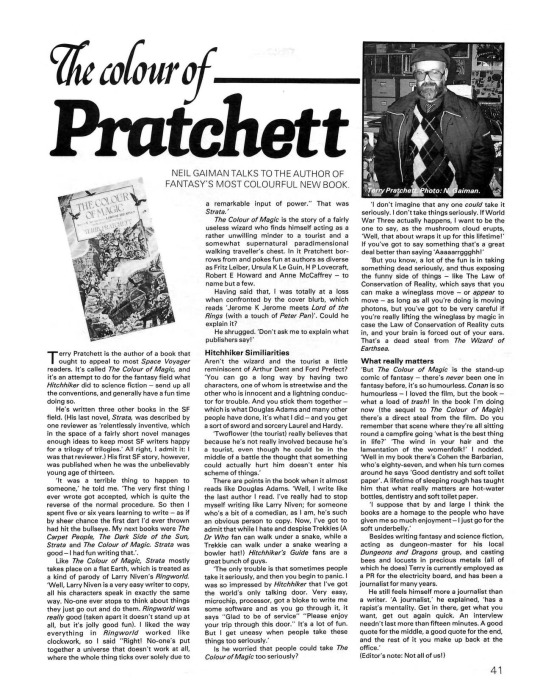
It ran exactly one page inside the June/July issue of that year. The interview took place in a Chinese restaurant in London.
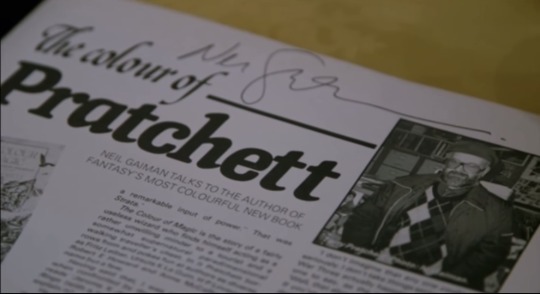
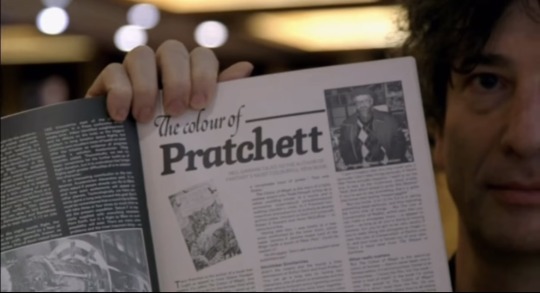
Here is Neil many years later holding that issue. You can see it here if you want. Warning: extremely emotional video.
Neil arrived wearing a grey homburg hat. “Sort of like the ones Humphrey Bogart wears in movies” he later wrote. (Before saying that in fact he did not look like him, but like someone wearing a grown-up’s hat). Terry Pratchett, photo courtesy of one @neil-gaiman, was in a Lenin-style leather cap and a harlequin-patterned pullover. At this point, Terry was already a hat person, although not that hat.
Terry offered Neil this : "An interview needn't last more than 15 minutes. A good quote for the beginning, a good quote for the end, and the rest you make up back at the office"*. (Terry Pratchett had worked many years in journalism by this point ).
But the meeting went terribly well. The two of them realized they had "the same sort of brains". So well indeed, that in 1985, Neil had shown Terry a file containing 5282 words, exploring a scenario in which Richmal Crompton's William Brown had somehow become the Antichrist. Was a collaboration in the cards as of that moment? Not really. But Terry found in Neil someone to whom he could send disks of work in progress and to whom he could pick up the phone sometimes when he hit a brick in the road of his writing.
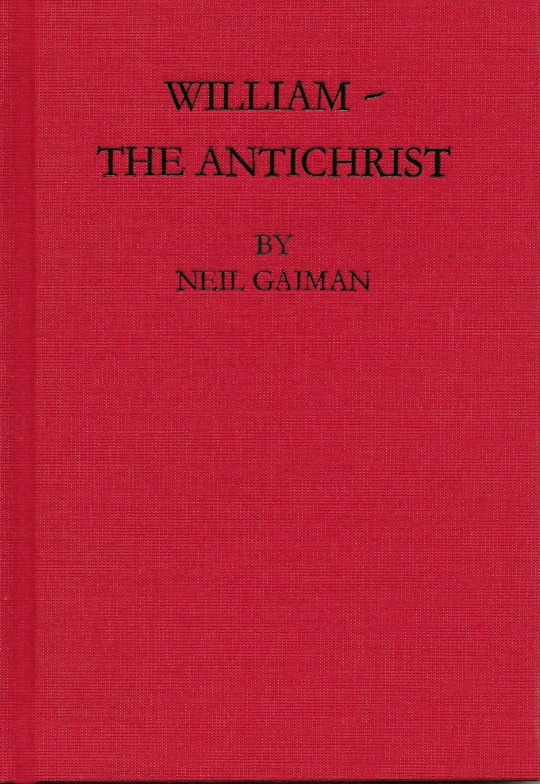
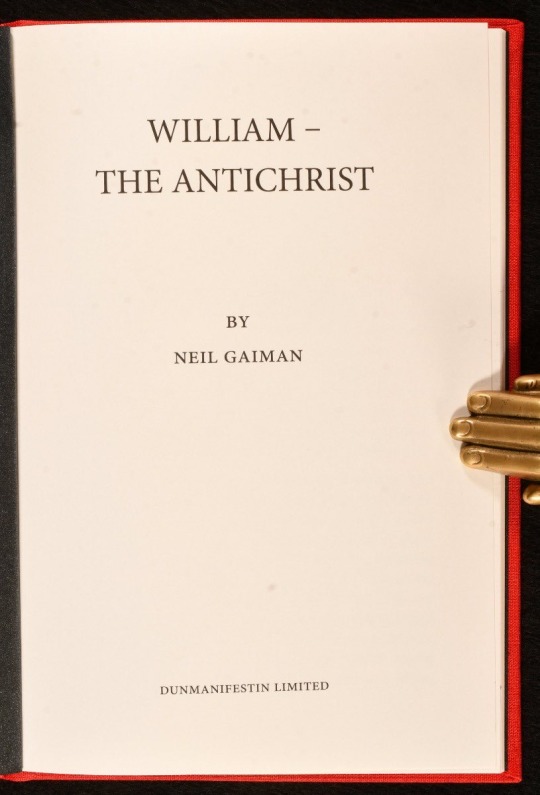
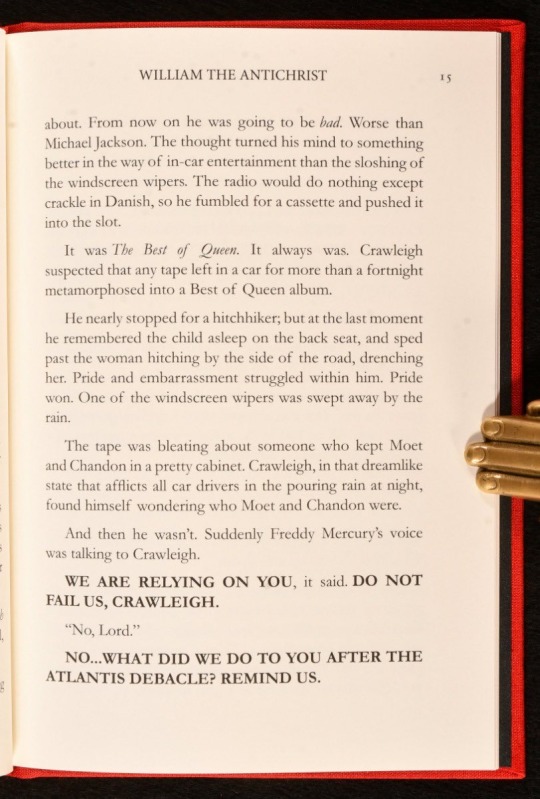
Terry loved it and the concept stayed in his mind. A couple of years later, he rang Neil to ask him if he had done any more work on it. Neil had been busy with The Sandman, he had not really given it another thought. Terry said, "Well I know what happens next, so either you sell me the idea or we can write it together". **
On collaborating together:
Here is a video of Sir Terry saying why he chose to collaborate with Neil, another video talking about the technical difficulties of writing a book when the two of them where miles apart ,and some pages from Interzone Magazine Issue 207 published December 2006:
An Interview with Sir Terry Pratchett and his works- and Neil Gaiman, where he shortly addresses the process of writing Good Omens.
Terry shortly mentions,
“Neil doesn't rule out another book with me and he was good to write with...yep, it could happen. With anyone else? I don't know, but probably not.?”
Neil says,
"Terry took that initial 5,000 words of mine and ran it through the computer (because I’d lost the files in a computer crash) and made it the first 10,000 words, and it was definitely Good Omens at that point. Neither one thing nor the other, but a third thing.”
"I think Terry could do a very good impersonation of me if he needed to, and I could do a very good impersonation of him; so we knew the area of the Venn diagram in which we were working. But mostly the book found its own voice very quickly. It helped that we were both scarred by the William books when we were kids...”


And as you know, unless you’ve been living in Alpha Centauri, the rest is history. That was the beginning of what would become William the Antichrist and later would get the name Good Omens:The Nice and Accurate Prophecies of Agnes Nutter, Witch. (Title provided by Neil Gaiman and subtitle by Terry Pratchett).
More about the writing process:

Terry took the first 5,000 words and typed them into his word processor, and by the time he had finished they were the first 10,000 words. Terry had borrowed all the things about me that he thought were amusing, like my tendency back then to wear sunglasses even when it wasn't sunny, and given them, along with a vintage Bentley, to Crawleigh, who had now become Crowley. The Satanic Nurses were Satanic Nuns.
The book was under way.
We wrote the first draft in about nine weeks. Nine weeks of gloriously long phone calls, in which we would read each other what we'd written, and try to make the other one laugh. We'd plot, delightedly, and then hurry off the phone, determined to get to the next good bit before the other one could. We'd rewrite each other, footnote each other's pages, sometimes even footnote each other's footnotes. We would throw characters in, hand them off when we got stuck. We finished the book and decided we would only tell people a little about the writing process - we would tell them that Agnes Nutter was Terry's, and the Four Horsemen (and the Other Four Motorcyclists) were mine.
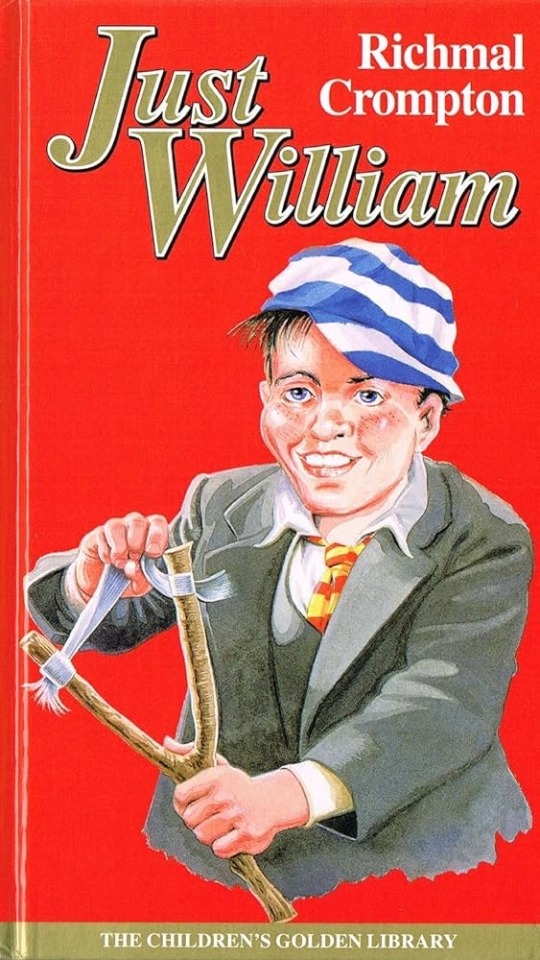
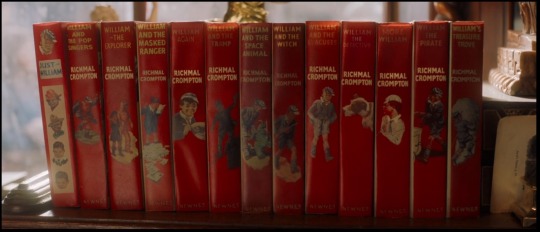
From the introduction to William the Antichrist:
“In the summer of 1987 several odd ideas came together: (..)I found myself imagining a book called William the Antichrist, in which a hapless demon was going to be responsible for swapping the wrong baby over, and the son of the US Ambassador would be completely undemonic, while William Brown would grow up to be the Antichrist, and the demon would need to stop him ending the world. The unfortunate demon, whom I called Crawleigh, because Crawley was a nearby town with an unfortunate name, would have to sort it all out as best he could.
It felt like a story with legs.
Terry took the 5,000 words, and rewrote them, calling me to tell me what he was doing and what he was planning to do. The biggest thing he was going to do, he told me, was split the hapless demon into two characters – a would-be-cool demon in dark glasses (which was, I think, Terry’s way of making fun of me, a never-actually- cool journalist in dark glasses) who had renamed himself Crowley, and a rare-book dealer and angel called Aziraphale, who would embody all the English awkwardness that either of us could conceive.”
William the Antichrist being a direct inspiration of the 1976 film The Omen. If the baby swap had just been a little bit messier and the kid had gone off somewhere else he would have grown up as somebody else. “And then there was a beat and I thought, I should write it, it will be called William the Antichrist” says Neil. ***
“The first draft of Good Omens was a William-book. It was absolutely in every way it could be a William book. It had Violet Elizabeth Bott, it had William and the Outlaws, it had Mr. Brown”.
Over time they realized that they would have more creative freedom if they in their own words filed off the serial numbers. William and the Outlaws becoming Adam and the Them.
But the spirit of Just William was never far away.
The joy for Neil was to construct “perfectly William sentences”. The one when Anathema tells Adam that she has lost the Book, and he tells her that he has written a book about a pirate who became a famous detective and it is 8 pages long… that’s “a William sentence”.
If you want to read more details about William The Antichrist, here are some slides I made.


Good Omens was also inspired by a particularly antisemitic moment in The Jew of Malta and John le Carre's spy novels. (Neil’s ask)
Then I was reading The Jew of Malta by Kit Marlowe, and it has a bit where the three (cartoonishly evil) Jews compare notes on all the well-poisoning and suchlike they’d done that day, and as a Jew who never quite gets his act together, it occurred to me that if I were the third Jew I’d just be apologizing for having failed to poison a well… And suddenly I had the opening of a book. It would be called William the Antichrist. And it would begin with three Demons in a graveyard… (x).
“When we finished the book we estimated that the words were 60% Terry’s and 40% mine, and the plot, such as it was, was entirely ours.” -Neil Gaiman
"Neil and I had known each other since early 1985. Doing it was our idea, not a publisher's deal." "I think this is an honest account of the process of writing Good Omens. It was fairly easy to keep track of because of the way we sent discs to one another, and because I was Keeper of the Official Master Copy I can say that I wrote a bit over two thirds of Good Omens. However, we were on the phone to each other every day, at least once. If you have an idea during a brainstorming session with another guy, whose idea is it? One guy goes and writes 2,000 words after thirty minutes on the phone, what exactly is the process that's happening? I did most of the physical writing because: 1) I had to. Neil had to keep Sandman going -- I could take time off from the DW; 2) One person has to be overall editor, and do all the stitching and filling and slicing and, as I've said before, it was me by agreement -- if it had been a graphic novel, it would have been Neil taking the chair for exactly the same reasons it was me for a novel; 3) I'm a selfish bastard and tried to write ahead to get to the good bits before Neil. Initially, I did most of Adam and the Them and Neil did most of the Four Horsemen, and everything else kind of got done by whoever -- by the end, large sections were being done by a composite creature called Terryandneil, whoever was actually hitting the keys. By agreement, I am allowed to say that Agnes Nutter, her life and death, was completely and utterly mine. And Neil proudly claims responsibility for the maggots. Neil's had a major influence on the opening scenes, me on the ending. In the end, it was this book done by two guys, who shared the money equally and did it for fun and wouldn't do it again for a big clock." "Yes, the maggot reversal was by me, with a gun to Neil's head (although he understood the reasons, it's just that he likes maggots). There couldn't be blood on Adam's hands, even blood spilled by third parties. No-one should die because he was alive." -("Terry Pratchett : His World”)
(Here are some slides of mine where I go into some other details concerning the origins of Good Omens).
Another wonderful insight with Rob Wilkins in "The Worlds of Terry Pratchett".
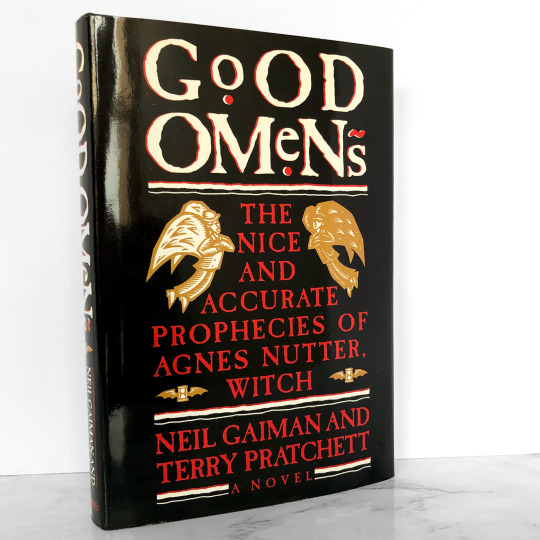
*Quote: from Terry Pratchett A Life With Footnotes by Rob Wilkins, but said by Terry of course.
** All the quotes, facts listed here : see above.
***all other quotes by Neil Gaiman from various interviews and asks I’ll link.
#good omens#neil gaiman#terry pratchett#crowley#aziraphale#ineffable husbands#good omens fun facts#the colour of magic#the colour of pratchett#space voyager magazine
4K notes
·
View notes
Text

“Sun Ra always saw his music as space music,” says Crown Family School associate professor William Sites. Read about Sun Ra’s application to have his music included on NASA’s Golden Record.
Sun Ra, NASA application. Alton Abraham Collection of Sun Ra [Box 13, Folder 7], Hanna Holborn Gray Special Collections Research Center, University of Chicago Library
#uchicago#university of chicago#chicago#university of chicago magazine#archives#nasa#sun ra#jazz#space#golden record#voyager
31 notes
·
View notes
Text




Starlog #225-228
0 notes
Text
Mem., get recipe for Mina: a food guide to Dracula Daily
Inspired by There and Snack Again (in which you eat along with the LOTR movies), this is your guide to eating and drinking along with Dracula Daily.
All under a cut because there's no way I can do this without extensive spoilers. I strongly recommend not reading this unless you already know what happens in Dracula. Also only if you're comfortable reading about alcoholic drinks - there's a lot of booze in this novel.
Let's eat!
2 May We start with the famous paprika hendl. Google "chicken paprikash" and choose whichever recipe most strikes your fancy.

3 May For breakfast, choose from mamaliga (cornmeal porridge, similar to grits), "impletata" (vânătă umplută - stuffed aubergine) or anything with more paprika in it.
4 May For dinner, Jonathan has robber steak: "bits of bacon, onion, and beef, seasoned with red pepper, and strung on sticks and roasted over the fire".
5 May Slivovitz, if you'd like it (Jonathan declines). Then, for dinner, Dracula serves up roast chicken, with some cheese, a salad and a glass or two of Tokaji wine.
6 May "A cold breakfast" for Jonathan. In Romania a cold breakfast might include boiled eggs, telemea (sheep's cheese), franzela (bread) with assorted spreads, sliced cucumber and tomatoes, and sunculita taraneasca (sliced smoked pork). Jonathan also has "an excellent supper", but doesn't tell us what that includes.
16 May Would it be too bleak if I suggested eating a symbolic Jelly Baby?
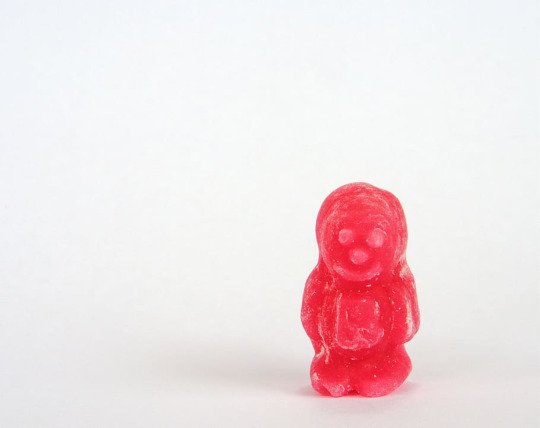
26 May A glass of wine as Quincey and Jack congratulate Arthur and drown their sorrows.
18 June There's a kind of Scottish fruit slice called "flies' graveyard". That might make a suitable snack given Renfield's meal today.
24 June I guess a gingerbread woman, for the wolves? IDK, it turns out doing this for a horror novel is a bit grim.
8 July Thankfully the internet has hundreds of ideas for spider-themed cakes so you can eat along with Renfield.
18 July The voyage of the Demeter begins! Celebrate by eating like a sailor: have some salt pork, or make ship's biscuit.
20 July Renfield has just eaten several sparrows. Provide redress by feeding birds near you, bird flu guidance permitting.

24 July Imitate the "feet-folk" from York and Leeds by drinking some tea or eating some cured herring.
10 August Lucy and Mina enjoy a "severe tea". There are lots of severe teas in Victorian literature, but few writers actually describe what's in it - e.g. the Churchman's shilling magazine, 1868, has a story with a severe tea "which implies coffee, tea, and muffins, with substantials". What are substantials? I have no idea, but that's what you should eat today.
11 August Dracula has a little nibble on Lucy. I don't suggest doing this for every vampire bite in the novel, but given this one is particularly significant, how about marking the occasion with some black pudding?
30 August No food details for a while, but in this entry, Lucy notes that she "has an appetite like a cormorant" and "Arthur says I am getting fat". Celebrate with some cake.
3 September Van Helsing has been! And surely he wouldn't have come all the way from the Netherlands empty-handed? Acknowledge his visit with some gouda or a stroopwafel.
4 September Eat some sugar, which Renfield has requested for his flies.
7 September To stay in line with what the characters actually eat and drink, have a glass of port (though ideally not if you've just given blood). But for the real spirit of the day, consider a corn-on-the-cob.
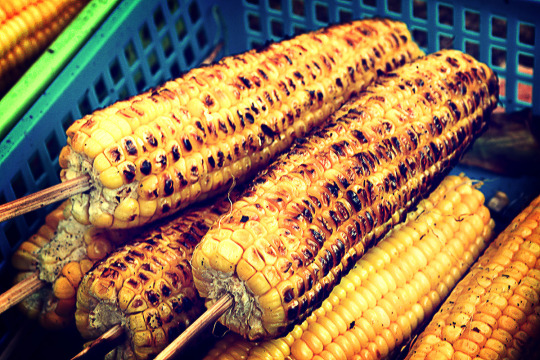
9 September Free space! Jack has "an excellent meal" but doesn't say what it is. Dig into your favourite dinner.
10 September A sip of brandy, with which Van Helsing wets Lucy's lips.
11 September The garlic flowers arrive. There's lots that you can make with wild garlic - personally, I like it in risotto.
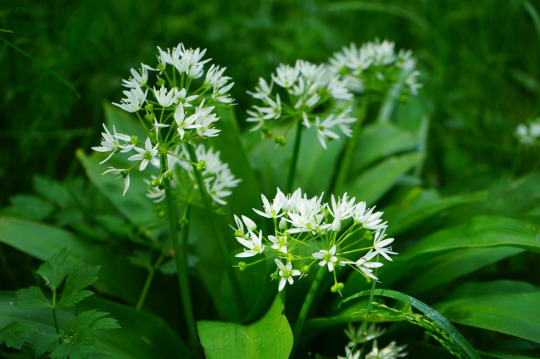
17 September A boxful of garlic flowers arrive for Lucy every day. Time to make chicken with 40 cloves of garlic. Other options for today include more black pudding (in honour of Renfield lapping up Jack's blood) or sherry.
18 September The Zookeeper enjoys a teacake, and so shall we.
20 September No food, but the labourers have "a stiff glass of grog". This is rum diluted with water, but you could also add lemon or lime juice, sugar, and/or cinnamon.
25 September Nibble another Jelly Baby for the Bloofer Lady.
29 September A lot happens in this entry, but there's not a lot of food. There are thirsty labourers, however. Maybe have a beer?

30 September Mina makes everyone a pot of tea. Also, we don't know what they have for dinner, but they eat it at 7pm, if you'd like to time your evening meal accordingly.
1 October More tea! Since this is being gulped down by a working man, make it builder's style - strong, sweet, lots of milk.
2 October Jonathan visits the Aërated Bread Company. He only has a cup of tea, but you could have whatever you like best from their menu:
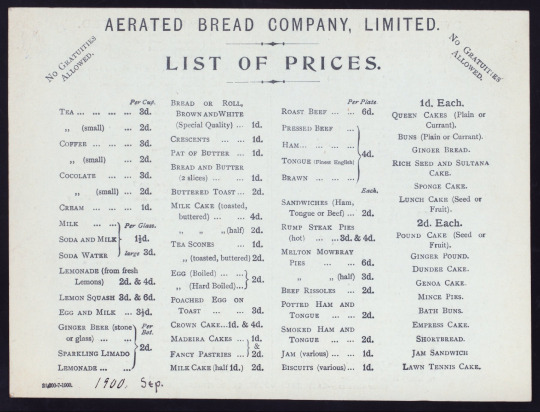
(source)
3 October Dracula forces Mina to drink his blood like "a child forcing a kitten's nose into a saucer of milk". You could either have some more black pudding, or drink a glass of milk in solidarity with Mina.
15 October The Crew of Light aren't focusing much on meals any more, but they have travelled on the Orient Express. Here's the 1887 dining car menu.
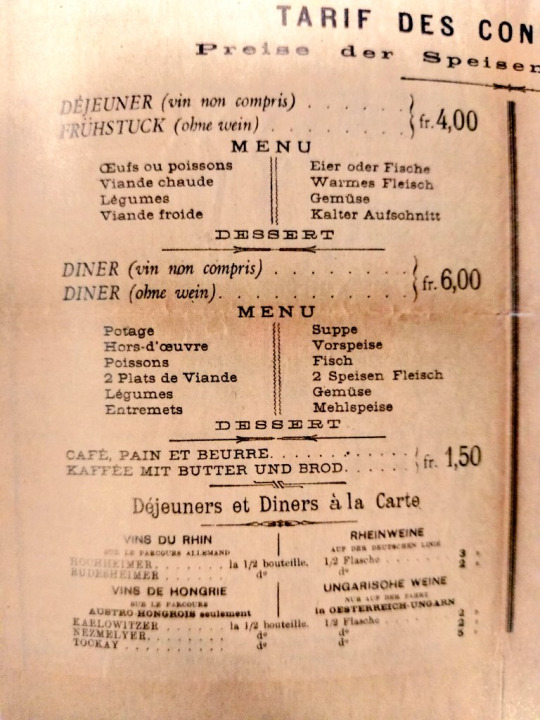
(source - I can't vouch for the accuracy of a random person on Twitter but it looks plausible)
29 October No one is thinking of food in this bit of the novel (though Mina makes yet more tea), but as they're heading to Romania, have some sarmale. These stuffed cabbage rolls are the Romanian national dish.
31 October Mina and Van Helsing have "a huge basket of provisions". Have a picnic in their honour, if it's warm enough where you are.
1 November Mina and Van Helsing have "hot soup" into which the local cooks have put an extra amount of garlic. Consider having a truly extra amount of garlic with this 44-garlic-clove soup.
7 November The Crew of Light return to Transylvania. No details of food, but in honour of their journey, I would suggest a final round of chicken paprikash, to bring us back to where it all began.
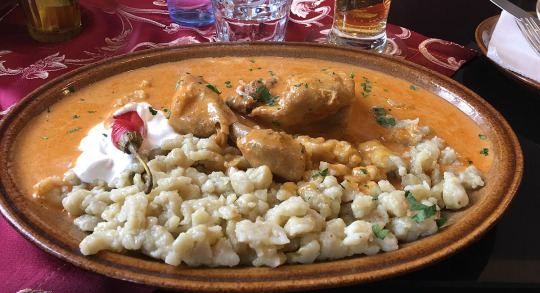
#dracula daily#dracula spoilers#long post#incredibly long post#let me know if i've missed any notable meals and i'll add them in#posted a day or two before the start of dracula daily so anyone wanting to eat along has time to get their shopping in
3K notes
·
View notes
Text
Klingons & Racialisation - the Long Post
This post is an overview of the racial coding of the Klingons from their first appearance to the present day, illustrated by quotes from Trek writers, actors and crew members taken from the Memory Alpha article Depicting Klingons, with my own interjected summaries and explanations. It is by no means comprehensive (I likely missed some stuff), and does not offer critical analysis of the quotes provided, but nonetheless is intended to demonstrate irreproachably the open fact that Klingons have always been intentionally written and designed as non-white -- something that fandom consistently fails to take into account when perpetuating racist stereotypes and reiterating racist canon content. I recommend reading the whole article for a more in-depth understanding of the subject, as well as seeking out the existing writing of fans of colour. This post is primarily for reference purposes so I've tried to limit my own analysis and opinions, but I do post those in my Klingon tag as well as more general headcanons and worldbuilding and I'm happy to answer any (good faith) questions this post may raise.
As always, if I have overstepped in any way as a white fan in making this post, I am grateful to be informed and will make any required changes.
Content warning for outdated and offensive language under the cut.
The Original Series
"There is some suggestion that the Klingons represent a Cold Warrior's view of China in the 1960s – swarthy, brutally repressive." (Star Trek Magazine issue 153, p. 66) "And I think he was basing a lot of it on the kind of attitude of the Japanese in World War II...." ("Errand of Mercy" Starfleet Access, TOS Season 1 Blu-ray) The script of "Errand of Mercy" introduces the Klingon look by saying, "We see the Klingons are Orientals," "Spray my hair black, give me a kind of swamp creature green olivey mud reptilian make-up, and we'll borrow some stuff from Fu Manchu, and put a long moustache and eyebrows on me." ("The Sword of Colicos", Star Trek: Deep Space Nine - The Official Poster Magazine, No. 8) "I think the makeup was called 'Mexican #1 or #2.' That was the name of the original makeup foundation – they actually had kind of racist names at the time, like 'Negro #1' and 'Mexican #2' – which was the basis for the original Star Trek makeups." (Star Trek Magazine issue 172, p. 59) "In the original series, all they wore was a dark face and their black hair," Michael Westmore observed. ("Michael Westmore's Aliens: Season Two", DS9 Season 2 DVD special features) The Klingons' appearance changed within the original Star Trek series; although dark makeup and heavy eyebrows were the norm, the Klingons of "The Trouble with Tribbles" were much lighter-skinned and more Human-like in appearance.... He noticed that they are not only less like Mongol warriors by having less of a swarthy appearance but also by being slightly not as fierce... ("The Trouble with Tribbles" Starfleet Access, TOS Season 2 Blu-ray) "...they were meant to represent the Communist foes of the United States specifically during the Vietnam War, which was being controversially fought at that time. (Star Trek: The Original Series 365, p. 222) "...let us never set up a situation whereby those adversaries of ours [Klingons] give any indication of ever being anything but highly aggressive and self-seeking opponents." (These Are the Voyages: TOS Season Three)
Here it is explicitly stated that the Klingons were based on various Asian cultures, with the USSR also being mentioned heavily in the article. This influence and the use of "yellowface" is covered more comprehensively in this youtube video Klingons & The History Of Racial Coding. However, the video has some notable gaps which I hope to cover in this post.
Post-TOS (movies)
The Star Trek III portrayal of Klingons took inspiration from Japanese history. "Harve [Bennett] had the notion that the Klingons were like Samurai warriors," explained linguist Marc Okrand. (Star Trek: Communicator issue 114, p. 27) Robert Fletcher agreed with Bennett, later saying of the Klingons, "I always liked to think of them as authoritarian, almost feudal, like Japan had been." (The Making of the Trek Films, UK 3rd ed., p. 52) Regarding the make-up, Michael Westmore observed, "Until now, Klingons were brown. Some had a bony ridge running down the middle of their foreheads, long black wigs and facial hair." (Star Trek: The Next Generation Makeup FX Journal, p. 28) "I thought it was an ideal way for us to have our closure too, because the Klingons for us have always been the Communist Block, the Evil Empire. It just made sense to do that story." (The Making of the Trek Films, UK 3rd ed., p. 100) "Gene was really bothered by the Klingons in VI [....] [They] were, in his words, 'too civilized, too decent, too much of the good guys in the story.' [....] [The Klingon detente] was not the way Gene would have handled it. He would have reversed it, he would have had the Klingons being the ones who couldn't handle the peace, with the Federation saying, 'Come on, let's try and work this out.'" (Star Trek Movie Memories, hardback ed., p. 289) "The story never explored the Klingon culture the way I'd hoped it would [....] I was hoping for greater insight into the Klingons." (I Am Spock) Nimoy hoped, in specific, that the movie would provide some important insight into why the Klingons had "always been so angry, such nasty, vicious murderers." Nimoy wanted the insightful knowledge to be an intellectually transformational force, changing the thinking of Kirk and the audience. (Star Trek Movie Memories, hardback ed., pp. 287-288) In an interview in the DS9 Season 7 DVD, Robert O'Reilly observed that a long-running joke among actors who have played Klingons is that they do not want to appear in the Star Trek films as, he believes, the only purpose of a Klingon in one of the films was to be killed off.
Although these last three quotes may not seem relevant, I believe they highlight an important facet of the racialisation of the Klingons. It reads as though Gene Roddenberry was against depicting the Klingons in a more sympathetic light than the Federation, and considering that the Klingons are intended to be non-white, refusing to give depth or motive to their anger in favour of keeping them "nasty, vicious murderers" comes across as fairly racist, especially when these kind of reductive and harmful stereotypes could've been challenged as Nimoy suggests. The treatment of Klingons as disposable villains is also concerning in this context.
The Next Generation
African-American actors were often cast as Klingons in TNG and subsequent Star Trek productions. This practice wasn't racially motivated but was instead carried out because it lessened makeup time, as the performers already had a brown complexion without having to have their skin painted that color. (Stardate Revisited: The Origin of Star Trek: TNG, Part 2: Launch, TNG Season 1 Blu-ray) Tony Todd, who portrayed the recurring Klingon character Kurn, stated, "I don't look at the Klingons necessarily as African-Americans, but it's about tapping into something–they're certainly an alienated people, so maybe that's why African-American actors can identify with those characters. But that doesn't mean it's exclusive to them." (Star Trek: Communicator issue 116, p. 54) Michael Westmore actually changed the Klingon facial design in numerous ways, though. He stated, "I added a Shakespearean style of facial hair and a forehead bone structure based on dinosaur vertebrae and I was able to modify motion picture Klingons for television." (Star Trek: Aliens & Artifacts, p. 59) In "A Matter Of Honor", the Klingons were intended to be used to shed some light on a common social problem prevalent at the time of the episode's making. This was, namely, what it was like to be the only person of either white or black skin coloration while surrounded by people of the other color. The Klingons were selected to illustrate this theme as a spin on the usual arrangement of a predominantly Human crew serving aboard the Enterprise-D alongside Worf. (Captains' Logs: The Unauthorized Complete Trek Voyages, p. 176) Two historical societies, the Samurai and Vikings, served as other inspirations, Moore perceiving about Klingon culture, "There was the calm, elegant reserve associated with the Samurai but there was the 'party-down' like the Vikings." (Star Trek: Communicator issue 114, p. 58) "I stopped thinking of the Klingons as the Cold War adversary," he explained. "I didn't think it fit [....] The place where the Russians were when I was doing the Klingon shows just wasn't as relevant any more." (Star Trek: The Magazine Volume 1, Issue 19, pp. 64-65) "The Klingons are not evil, tyrannical pirates bent only on pillage and plunder. They have a strict, almost unyielding code of ethics and honor and take their responsibilities as rulers seriously." Following a description of the Klingon homeworld, the memo continued by saying, "Klingon society could most closely be compared to that of Sparta or feudal Japan." ("Sins of the Father" audio commentary, TNG Season 3 Blu-ray) Having recently seen the film Malcolm X, he imagined the Klingons in the "Birthright" duology as metaphors for black people. (Captains' Logs: The Unauthorized Complete Trek Voyages, p. 274; Star Trek: Communicator issue 105, p. 16) "There's a certain way you have to carry yourself. You have to really be able to project the violence and the anger [....] All you have to do is think of the Spartans. They say, 'They'd rather have you come home dead on your shield than come home a coward.' [18]
This is where I feel the video essay previously mentioned falls short -- in the next gen era, Klingons are now explicitly black-coded. While some Asian cultural influences are still cited, they learn more towards the historical and are intermixed with other historical European influences (Spartans, Vikings, Shakespeare) rather than being fueled by contemporary prejudices towards the political enemies of the US as they were in the TOS era.
Deep Space Nine
Fields also generally based the Klingon group on American Western prototypes from the film The Magnificent Seven or, to a lesser extent, Japanese prototypes from The Magnificent Seven's movie source material, Seven Samurai. (Star Trek: Deep Space Nine Companion (pp. 131-132)) "So, the hair [...] was permed. So, it had more of a curl instead of the straight type look, and by perming it, they were able to kind of give them larger, bigger hair, so it was more like a mane." ("Michael Westmore's Aliens: Season Two", DS9 Season 2 DVD special features) "I don't know how you could equate Klingons with what's going on in the world today," he admitted. "I think the intention was to make them like samurai. That hairdo they gave them is very much a samurai hairdo. A lot of the fight sequences, the moves with the bat'telh, are very much taken out of the Asian martial arts [....] It's very romantic you know, these three old guys, the Klingon over-the-hill gang." (The Official Star Trek: Deep Space Nine Magazine issue 15, pp. 17-18) "It was different for them to get into this makeup, because [...] [the makeup was more elaborate and] the beards were bigger, and they were greyer, and they had curls to them, and the moustaches, they had the Fu Manchu look to them. So, they weren't used to sitting that long to be a Klingon." ("Michael Westmore's Aliens: Season Two", DS9 Season 2 DVD special features) For recreating some old-style Klingons in "Trials and Tribble-ations", the Klingon-playing actors had to be made up with the same swarthy, shiny brown makeup as used in the original series. (The Magic of Tribbles: The Making of Trials and Tribble-ations) ...he had them unite in song, thinking this was "just the kind of thing that Klingons do" because they are, in his opinion, similar to Vikings. (Star Trek: Deep Space Nine Companion (p. 449)) "I always saw the Klingons as a combination of Japanese Samurai who haven't had their morning coffee (or tea!) and African Zulu warriors." [25]
In DS9 the only inspirations cited seem to be historical, once again leaning towards feudal Japan and the Vikings. Interestingly although the Klingons here are predominantly dark-skinned, I don't think that J.G. Hertzler, who is white, had his skin significantly darkened to play Martok (at least, not compared to the obvious brown makeup worn by other white actors playing Klingons). Having a white actor play a Klingon without dark makeup could've set a precedent decreasing the use of such practices later on, but no one seems to have picked up on it.
Enterprise
The Klingons of ENT: "Sleeping Dogs" were based on the crew of the Russian submarine Kursk. "For me," said Dekker, "the point was to acknowledge the Klingons as 'people' – to find them in a clear position of distress [....] The idea to 'humanize' their plight was mine, and it wasn't anything I thought about as far as canon. It just seemed right." (Star Trek: The Official Starships Collection, issue 41, pp. 10-12) In the final draft script of "Affliction", the altered Klingons were initially referred to as "fierce-looking aliens" and were further described thus; "The aliens have a swarthy complexion, and dark facial hair... they could easily be mistaken for Humans. We'll eventually learn these are Klinqons... but their cranial ridges have disappeared."
At this point in time it seems the Klingons had essentially done a 180 from one-dimensional villains to sympathetic fan favourites, while still retaining the skin-darkening aspect of their makeup and "barbaric" characterisation. Although this is not mentioned in the article's section on the Abrams films, the images provided do demonstrate a level of skin darkening for the Klingons' brief appearance in Into Darkness.
The final section of the article is incomplete, meaning I don't have a lot of information for Discovery's redesign of the Klingons. The sources I can find cite ancient civilisations such as the Byzantines as well as Islamic architecture as inspiration for the set design, with a baroque influence on the costumes. I have heard rumours that the crew of Discovery have cited North African cultures as their inspiration for the Klingons but I can't currently find a source for this. Despite the lack of direct quotes, it's visibly clear that the Klingon makeup is still darkening the skin of white actors, although this time also to non-human blue and purple colours, as well as altering certain features in a racialised way. To elaborate: Mary Chieffo, who plays L'Rell on Discovery, is white and has a very thin nose and small lips, but in costume these are broadened in a way that seems imitative of African ethnic features.
As of the making of this post (early August 2023) I haven't seen any of Strange New Worlds, but from some cursory research its latest episode (Subspace Rhapsody) seems to have put a white actor (Bruce Horak) in brown makeup to play a Klingon. I am deeply disappointed that on a television set in 2023 people can still be darkening an actors skin like this without questioning the racial implications of what they're doing.
Thank you for reading to the end of this post. Please feel free to link to it if you found it useful enough to cite in another context. I would like to reiterate that I am white and while this is an issue I care deeply about it is not one I have an emic understanding of, and if anything I've said here is inappropriate I would be very grateful to be made aware.
#ive tried to make this like. really formal to cover the fact that im fuckin Ragin at snw for doing literal fucking brownface in 2023#next up top ten things fans should Fucking Reconsider saying about klingon characters#anyway#i feel like as a white trekkie who's big into klingons there's this insane blindspot when it comes to The Racism#that ive only ever seen fans of colour talk about#so if i have one goal for this post its to try and reduce that blindspot a bit and give people something concrete to point to#when some fuckwits in their notes acting as tho ~theyre aliens so it cant be racist~#tlhIngan#ghItlhpu'wIj
232 notes
·
View notes
Text
Good Omens Through the Decades
UPDATED!
This is a timeline of all the events that have happened related to Good Omens, from its inception to its publication to its future plans; editions, adaptations, failed adaptations and the like.
I originally wanted to have this post ready for the anniversary in May, that didn't work, it just kept getting larger. Then I wanted to do it for the anniversary of Season 2 in July, that didn't work either, for the same reason. So I am just going to post it now, a random date and hope for the best LOL. And guess what? After a fun and fruitful chat with another fan who prefers to remain anonymous, I added a couple of events a few trivia here and there (thank you!). So, a little bit of warning: it is loooong, lots of things have happened in 34 years. At the beginning I was going to put all the references at the end of the post, but they are a lot, so I put them in a document instead.
*Yes, of course I am aware of the allegations. But this is about the history and the world of Good Omens which is so much bigger than one person, even if that person started the whole thing. It is ours now. It is Terry's and Rob's. It is David and Michael's, Douglas McKinnon's, David Arnold's and the rest of the cast and crew. It is Colleen Doran's, Dirk Maggs's, Terry Gilliam's, Vicki Larnach, Jim Hare and Jay James Moody's. It is Stephen Brigg's and Martin Jarvis's. And so many other people who have brought or will bring its many iterations to life. It is the fans'.
1985-1990 - The Book
1985, Jan - Terry and Neil met for the first time when Neil interviewed Terry for Space Voyager magazine after "The Colour of Magic" was published [1,2] *For years they both wholeheartedly believed it had been at a Chinese Restaurant during February. Some time after Terry passed away Neil found his diary for 1985 where the entry said it had been in January at an Italian Restaurant [3]
1987, summer - Neil wrote the first 5000 words of a story and sent it to a few friends, including Terry; "An exchange in Marlowe’s The Jew of Malta, combined with a late night viewing of The Omen and a love of Richmal Compton’s immortal Just William stories, had put a story into my head, about a demonic baby-swap that goes wrong, in which the Antichrist grows up to be a nice kid, with a dog and a gang" [1,4]
1987, Oct - Sandman began and William the Antichrist went into the back back back burner [1]
1988, spring? summer? - Terry called Neil and offered to either buy the idea or write it together; "About a year later I took it out of the drawer and did see what happened next, even if I couldn’t see how it all ended yet" [5]
1988, summer - They wrote it together (do you really need a reference? 😉)
1988-1989 - First draft took about nine weeks. After Richmal Compton's estate did not reply to the request of using William Brown and his world, William became Adam, Pepper and War became female and the book got a new title (Good Omens by Neil) and subtitle (The Nice and Accurate Prophecies of Agnes Nutter, Witch by Terry). The second draft took about four months. There were still about five more months of polishing and editing and auctioning and more editing [4,6] *Good Omens was the first Terry book that ever went to auction. It ended up going for £150,000 [7]
1989, Halloween - During the World Fantasy Convention in Seattle, Terry and Neil started plotting what could become the sequel to Good Omens and called it "668 The Neighbor of the Beast" [6,8] *The real-life experience of trying to piece together the plot of a soft porn movie using little free increments from hotels' pay-per-view over time probably made it into the sequel around here [7]
1990, May 10. Book published in the UK - Hardback published in the UK by Victor Gollancz (with whom Terry had already been working) to be followed by paperback by Corgi on May 23, 1991 [8,9] *After the first UK edition was published (Gollancz), several changes were made to the text to make it easier on US readers and to polish it a bit. The new text was used by both the US publishers (Workman) and the UK publishers of the paperback (Corgi). Gollancz was unaware of this alternate text until about 2009. They started using the Workman/Corgi text starting with their next edition in 2014 [9]
1990, Sep. Book published in the US - Hardback published in the US by Workman to be followed by paperback by Berkley on March 1992 [9,10] *UK editions list Terry's name first and US editions list Neil's name first. This was done because Terry was more known in the UK and Neil was more known in the US [7]

1991-2004 - The Movies
1991, Feb - Hollywood Studio Sovereign Pictures hired Terry and Neil to write an adaptation of the book for a movie. The studio had some specific requirements such as Crowley owning a night club, Aziraphale working as a curator for the British Museum, Tadfield with an abandoned pier and a miniature town in it and Satan. They ended up rejecting the script anyway [11] *It was at this point that Terry suggested Buddy Holly's "Every Day" as the theme for Good Omens. In this script some of the angels used for the series got started like Gabriel and Sandalphon and a big sequence had them use their haloes like frisbees inside the British Museum [11,12,13]
1992, Jan. Movie Script - Terry declined to write a second script, but Neil stayed and wrote one. In October the company got taken over and all dreams of a movie died [11,14] *In this script Crowley tries to run away to Alpha Centauri
2001-2002. Terry Gilliam Movie deal - Since about 1999, when he obtained the rights, and throughout the 00's Terry Gilliam tried hard to make a movie. The closest he came to it was in 2001-2002 when he got as far as casting the parts (Johnny Depp as Crowley, Robin Williams as Aziraphale, Mme. Tracey and Hastur, and Kirsten Dunst). But he couldn't get a US studio to invest the last $15M and the movie project collapsed [13,15,16] *Terry had received, back in 1989, a copy of the book asking for a blurb. The letter got lost and he thought the book had been sent as a pitch for a movie [16,17]
2004, Jun 20th - Hill House Publishers created the "Neil Gaiman's Preferred Edition Series" with limited editions of American Gods, Anansi Boys and Neverwhere. As a bonus for the subcribers, Hill House printed the 1992 movie script under the name "A Screenplay." Only 500 numbered and 52 lettered copies were ever made [11,18]

2005-2010 - The Sequel (and the Audiobooks)
2005, Jun - Terry and Neil met at the Audie Awards in New York and plotted a little more of the sequel. This was when the South Downs bit was thought up [19,20]
2005, Dec. Crowley and Aziraphale's New Year's resolutions - The list of resolutions came out sometime between Christmas and New Year's at Harper Collins' website [7] *The well-known idea of Crowley gluing coins to the sidewalk is not in the book at all, it came from this list
2006, Feb 28. New edition - The book was reissued in the US as a hardcover in two different versions. The text is the same but one version has a white cover with Crowley and Neil's name listed first, and a second version has a black cover with Aziraphale and Terry's name listed first [7,21] *This time the explanation for the authors' name order was to make sure the book could be found both under "G" and also under "P"
2006, Jul. Briggs Audiobook - ISIS released in the UK an unabridged audiobook read by Stephen Briggs in CD, MP3CD and cassette (it won the 2008 Audiobook Download of the Year by audible.co.uk) [22,23]
2009, Nov 10. Jarvis Audiobook - HarperAudio released in the US an unabridged audiobook read by Martin Jarvis in CD [24] *Martin Jarvis is the same narrator who recorded the Just William audiobooks, a nice Easter egg related to the origins of the book
2010, Sep 23 - Terry and Neil had dinner at a sushi restaurant in Cardiff and decided that the book should be adapted as a TV series and not a movie anymore (as per Terry Gilliam's advice). And if it goes well, the rest of the story, the unwritten sequel, should be adapted too [8,13,15] *It was around here that the idea of the sushi restaurant cameo with both of them being patrons started

2011-2013 - The Stage (and a failed TV series)
2011, Feb. Terry Jones TV series - Terry and Neil agreed to a deal to adapt the book into a four-part TV series made by Terry Jones and Gavin Scott. At the end they didn't quite like the script though [13,25,26]
2012, Jun - Amy Hoff's The Cult Classic Theatre was granted permission to adapt the book to a stage play [27] *One of the conditions was that no footage would be taken/made available and the script would not be shared/sold
2012, Aug- Narrativia was established as the production company that would handle all of Terry's work adaptations. The production of the TV series and of The Watch were then transferred from Prime Focus [28,29] *Narrativia was first revealed at "The Watch Team Interview" panel during the Discworld 2012 convention on Aug, 26th [28]
2013, Mar. Stage Play - Amy Hoff's play was presented on March 20-23 and 27-30 at the Cottiers Theatre in Glasgow [30]
2013, Apr - BBC drama producer Heather Larmour pitched a radio drama adaptation to the BBC [31]
2013, sometime. The Musical - Vicki Larnarch and Jim Hare, "two hippies from Sydney", had met with Terry and Rob about six months prior. Terry's interest had gotten piqued when they showed him The Chattering Order Nuns song and he asked them to come back with a showstopper and a few more songs. They came back with "All Living Things" and they got the green light to go forward with the adaptation [32]
2013, Dec 11 - In a meeting at The Groucho Club, Terry and Neil enter into talks with the BBC to adapt GO to TV [33]
2014-2015 - The Radio Drama
2014, summer - Dirk Maggs adapted the book into a Radio Drama and gave Terry and Neil a cameo as police officers pursuing Crowley [31,34] *In July, Neil advised Dirk to get Terry's recording asap, before he couldn't do it anymore. They did it in the summer and that day ended up being the last day Neil and Terry saw each other [35]. The rest of the recording happened during autumn [13]
2014, Aug - Terry asked Neil to make the TV adaptation of Good Omens, "I know, Neil, that you are very, very busy, but no one else could ever do it with the passion that we share for the old girl. I wish I could be more involved, and I will help in any way I can" [12] Neil, of course, said yes
2014, Dec. BBC Radio 4 Dramatisation - The six episodes aired between December 22nd and December 27th, 2014 on BBC Radio 4 [36]
2015, Jan 15 - Random House UK released the BBC Radio 4 Dramatisation in CD [37]

2015-2019 - The TV series (and some luxury limited editions)
2015, Mar 12 - Terry passed away 😢
2015, Mar 25 - Terry's funeral. As soon as Neil got back home, he started writing the script for the TV series [12] *Sometimes signed copies of the third draft of the pilot (dated 25 July 2015) appear in eBay
2015 - Jay James-Moody joined the team to produce the musical [32]
2016, Aug 1 - First read-through of the series script [38] *The scripts were finalized right before SDCC 2016 which was held July 21st-24th [39]. Both Maggie Service and Tim Downie were present in this read-through [40]
2017, Sep 18 - 2018, Mar 10. Season 1 shooting - Season 1 started shooting at St. James' park (with the 11 years ago scene) and ended in Cape Town, South Africa [13,41,42] *The read-through before shooting occurred on Sept 13, 2017 [43]
2017, Nov 13 - Full development reading of the musical at the York Theatre in Chippendale, Sydney, Australia [32,44]
2019, Feb 8 - The social media campaign to promote Season 1 started with a tour of the Chattering Order of St. Beryl, an acapella choir that traveled to different cities for events and TV shows [45,46]
2019, Apr 25. The Chattering Order of St. Beryl's video - The video "That Brand New Baby Smell" was released in YouTube [47]
2019, May 3 and 4 - Workshop production of the musical at IPAC in Wollongong, Australia. About ten days before the series premiere Vicki, Jim and Jay showed Neil and Rob a recording of this show [32,44,48] *Although a full recording of the workshop exists, they are not allowed to share it until it is finished
2019, May 21. Companion Book - A companion book to the TV series with interviews and behind the scenes photographs written by Matt Whyman was published by William Morrow [49]
2019, May 21. The Script Book - Headline Publishing Group released a script book in both hardback and paperback (The US edition by William Morrow followed on Jun 11th). All editions of the script book include an "Other Four Horsemen of the Apocalypse" deleted scene. An exclusive edition for Waterstones included an additional deleted scene (Aziraphale in the 1800). A hardback edition limited to 1000 copies with white cover included four different deleted scenes (thugs visiting the bookshop, Leonardo DaVinci, the televangelist and Crowley clothes shopping) and a series of sketches made on set by Lorna May Wadsworth. On Jan 15th of 2020, a paperback edition with the white cover was released; it contained all five deleted scenes from the other editions and a sixth one (Aziraphale trying to sell a book); this edition does not include the sketches however. [9,50] *The script book was created so the production could pay for the death of Agnes Nutter, a scene (and a character) originally written by Terry which was too expensive to film [3]
2019, May 23. The Illustrated Edition - The Pratchett Estate and Neil agreed on a revised definitive text. It was published in five versions collectively called the Definitive Edition. Two versions were published by Gollancz which they called the Illustrated Edition; a standard hardback with black cover and a limited edition in a slipcase with white cover signed by Paul Kidby, the illustrator [51,52]
2019, May 30. "Unholy Night" - The Chattering Order of St. Beryl's released their album "Unholy Night" on Amazon Music and other digital platforms [53]
2019, May 31. TV Series - Season 1 premiered in Prime Video 😊
2019, May 31. Soundtrack - Silva Screen Records released the soundtrack in CD, vinyl and mp3/wav download [54]
2019, Jul. The Definitive Edition - The other three versions of the revised text were published by Dunmanifestin, the company established by the Pratchett Estate to handle Terry's intellectual property. All editions were limited: The Occult Edition (July 1st) with only 1655 copies in a black clamshell box, the Ineffable Edition (July 4th) with 666 copies in a deluxe box including ephemera, and the Celestial Edition, made to order with only 24 copies [52,55]
2019, Aug 2. The BBC Radio Drama Collectors Edition - A vinyl box set by Demon Records included four LPs printed in black and white in illustrated wallets, commentaries by Neil and Dirk and a set of tarot cards. An Amazon exclusive limited edition of 500 sets also included a print signed by Neil [56]
2019, Aug - Neil pitched Season 2 to Amazon [57]
2019, Oct 28. Blu-ray and DVD - Amazon released the series in DVD, Blu-ray and steelbook limited edition Blu-ray (PAL) for the UK. The US version (NSTC) followed on November 5th in both DVD and Blu-ray, there was no steelbook edition for the US market [58]
2019, Dec - John Finnemore joined as co-writer of Season 2 [57] *In this meeting, John stated that he needed to know the ending before he could write so Neil came up with the ending of Season 2 in about 5 minutes right there and then

2020-2025 - TV Series Season 2, a new Audiobook and some other adjacent projects
2020, May 1st. Lockdown Video - A short video about a phonecall between Crowley and Aziraphale was created by Narrativia and The Blank Corporation for the 30th anniversary of the book. It was released in the the official YouTube account of the Terry Pratchett Estate (@terrypratchett6025) [59]
2020, summer - Neil started writing the script for Season 2 beginning with the opening scene for episode 1 [57] *The last scene written was Gabriel organizing the books by first letter of first line. It was planned as the last scene for Episode 2 but at the end got moved to another place [60]
2020, Sep 16 - Season 2 was officially greenlit (along with Anansi Boys) [61]
2021, Mar 26 - The Hillywood Show announced the Good Omens parody project [62]
2021, Jun 29 - Amazon announced Season 2 in a press release [63]
2021, Oct 18 - 2022, Mar 1. Season 2 shooting - Season 2 started shooting in the Bathgate studio. Some scenes were shot on location in different parts of Edinburgh and other areas [64,65] *The read-through happened over October 14th and 15th, three episodes per day [66], David had to attend via zoom since he was still in isolation from Georgia's covid [67]. On the other hand, Michel McKean (Shadwell in Season 1) was present for that zoom read-through but had to be drop out also for covid reasons [68]. Peter Davison (David's-father-in law) was asked to play Job's part after shooting had started (possibly replacing Michael McKean?) and Ty Tennant (David's son) was cast too after shooting had started but through audition [69]. Maggie Service was in the very first shot of the season and also in the last day, first one in last one out as she said [70]
2021, Nov 2. Full Cast Audiobook - HarperAudio released in the US a full cast audiobook with Michael Sheen as Aziraphale and David Tennant as Crowley. The audiobook was later released in the UK on January 14th, 2022 [71,72] *The original cover for the audiobook was designed by Henry Sene Yee; a lavender background with drawings of Crowley and Aziraphale facing away from each other. After Season 2 was released, the cover changed to one of the promotional posters [73]
2023, Mar 15. Good Omens HQ - The Terry Pratchett Estate and Neil Gaiman created Good Omens Headquarters. The headquarters launched official accounts in several social media platforms and a website that keeps track of collector's items as they are being revealed [74]
2023, May 10. Good Omens Parody - The Hillywood Show's parody premiered in their YouTube channel (thehillywoodshow) [75] *Amazon Video partnered with Hillywood to announce the premiere date for Season 2 within their parody video. Neil, Maggie Service and Daniel Mays appeared as guests
2023, Jul 28. TV Series Season 2 - Season 2 premiered in Prime Video 😊 *As part of the promo campaign two days before the premiere, Amazon screened the first two episodes in cinemas in several cities free for Amazon Prime members
2023-2024 - The Graphic Novel
2023, Aug 1. Graphic Novel - The Kickstarter campaign to fund the graphic novel adaptation with Colleen Doran as illustrator launched [76] *At its closure, 36,867 backers had pledged £2,419,973 (notice it is pounds, not dollars)
2023, Aug 25. Season 2 Soundtrack - Silva Screen Records released the soundtrack for season 2 in CD, vinyl and mp3/wav download [54]
2023, Dec 14 - Season 3 was officially greenlit [77]
2024, Apr 18 - The Graphic Novel Pledgemanager site launches for people who missed the Kickstarter campaign or to add extras to an already existing pledge [78]
2024, Jul 13 - Vicki Larnach, Jim Hare and Jay James Moody appeared as virtual guests at Nullus Anxietas 9, the Australian Discworld Convention 2024 held in Adelaide, to talk about recent push for the musical [79]

2025 - The Future
2025, January - Season 3 is scheduled to begin filming [80]
2025, Spring - Graphic novel is scheduled to be released [76] *The original release date was in July of 2024, however in April of 2024 it was announced that it would need to be pushed to the Spring of 2025 (Update #20)
There should be a special mention of a fan created musical parody for YouTube that was in development in Russia by 62Media. This was completely fan made and not connected to the Pratchett Estate, Neil, the BBC or Amazon (which is why it is not in the list). Unfortunately it had to shut down due to COVID [81]
Fun fact: During the tour to promote the book, back in 1989-1990 the song "Shoehorn With Teeth" by They Might Be Giants became the unofficial anthem of the tour since that is what they always ended up singing when things went too crazy [82]
#good omens#good omens book#good omens movie script#good omens musical#good omens stage play#good omens graphic novel#good omens 2#good omens 3#good omens radio drama#good omens through the ages (I mean decades)
45 notes
·
View notes
Text
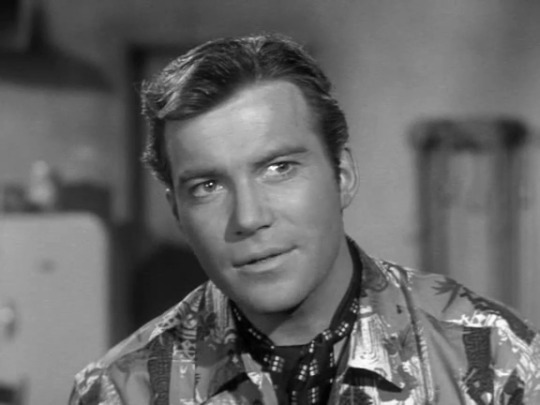
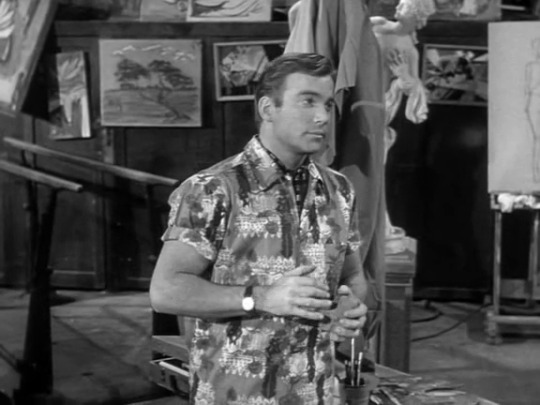
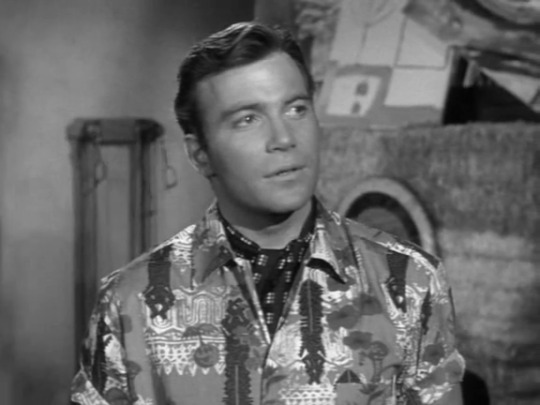
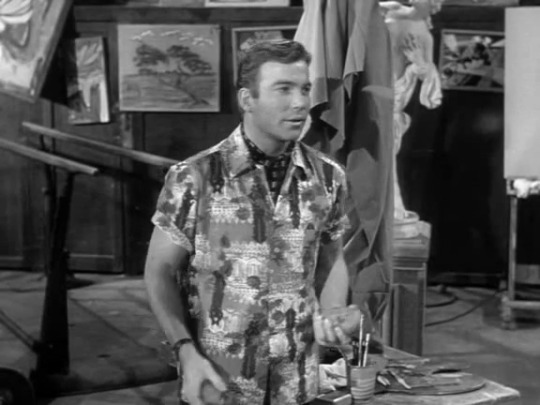
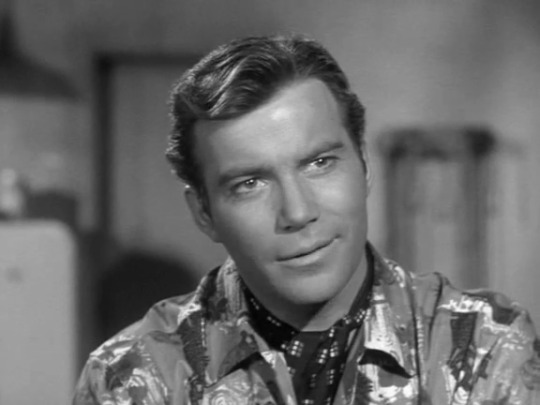
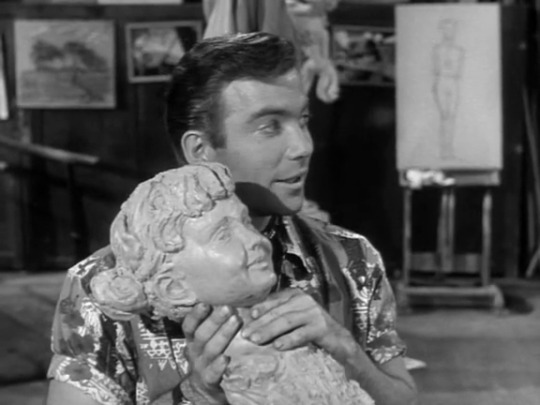
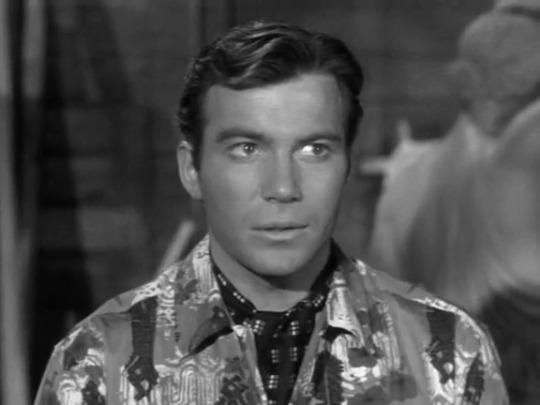
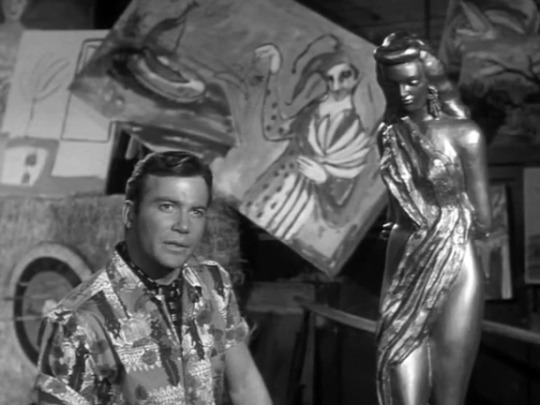
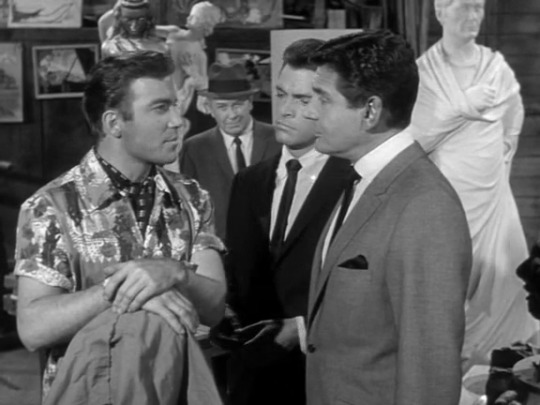
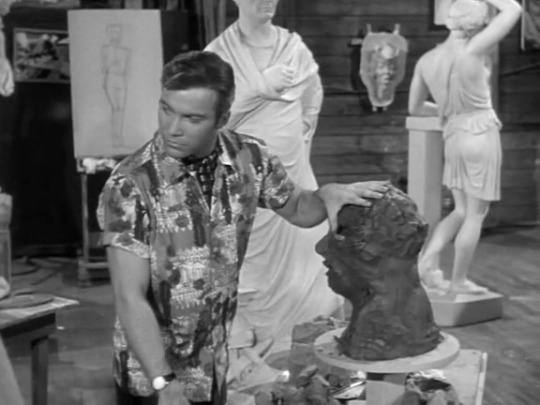
Today in the Department of Before They Were Star Trek Stars, William Shatner guest stars in "Who Killed Carrie Cornell," episode 1 of the third season of Burke's Law (original air date February 14, 1964).
In this police procedural, the eponymous Carrie Cornell is a deceased model who posed for both cheesecake magazines and bohemian artists. Shatner plays one of the latter, who is interviewed by the police. The murderer, however, turns out to be his roommate, a toxic gym bro who was disgusted by Carrie's habit of dating men who were less perfect physical specimens than himself. Seriously, this guy could have been Andrew Tate's Grandpa or something.
Other Trek connections:
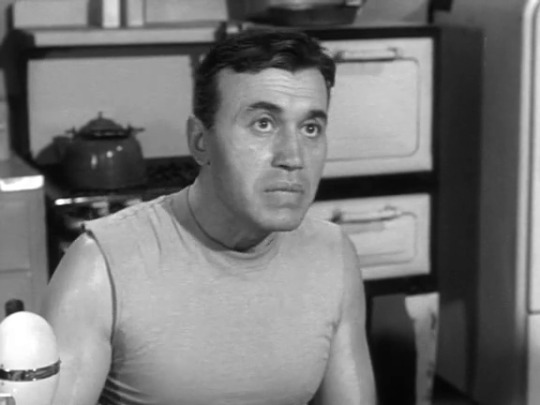

The killer of the week, who goes by the name of Big Bwana Smith, is played by Trek legend Michael Ansara, who brought the great Klingon warrior Kang to life in The Original Series, Deep Space Nine, and Voyager.
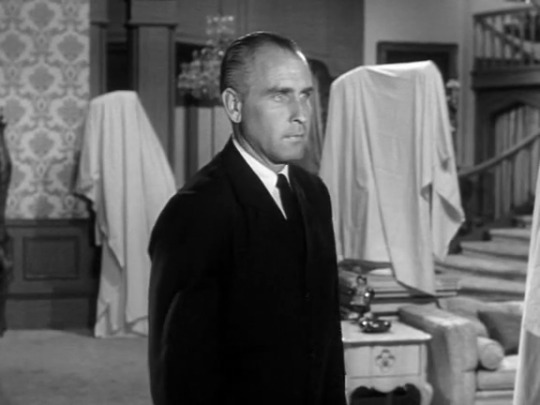
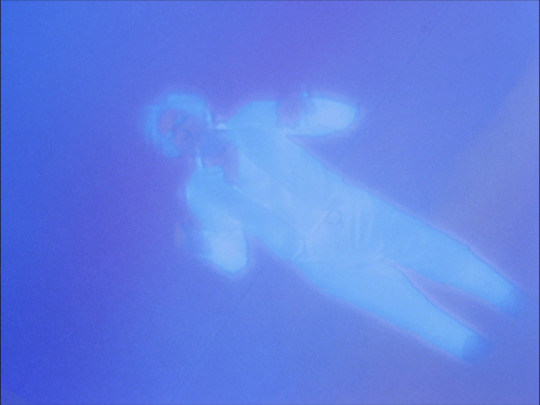
The magazine publisher's butler is played by prolific actor/stunt performer Bill Catching. Catching did stunt work on several episodes of Star Trek, mostly doubling for Leonard Nimoy. While doubling for Robert Brown in the episode "The Alternative Factor," he also played the anti-matter version of Lazarus.
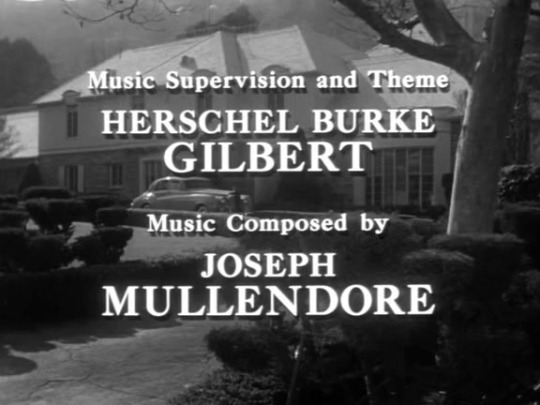
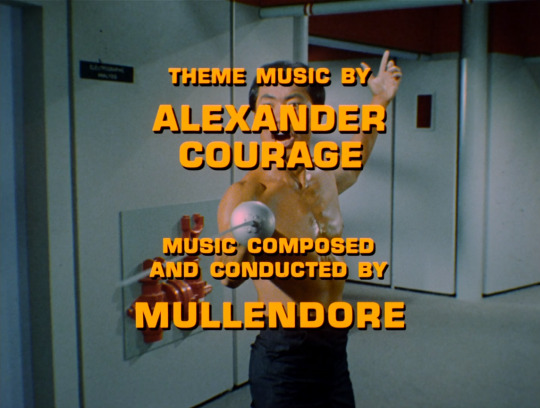
Music for Burke's Law is composed by Joseph Mullendore, who also composed and conducted music for the Star Trek episode "The Conscience of the King."
#star trek#star trek tos#star trek the original series#burke's law#1960s tv#tv sci fi#tv police rocedural#william shatner#michael ansara#bill catching
31 notes
·
View notes
Text

French cartoon shows a man riding on a bicycle-like flying machine while looking through a telescope attached to the front. Two balloons, "Veloc[ipedes]" and "Domanie," are attached at front and rear as are propeller-like wheels."Voyage a la lune" (Journey to the Moon) and was published in the French magazine "Le Charivari" in the late 19th century.This is a satirical take on the growing interest in space travel at the time. The French cultural obsession was inspired by general interests in space, but was inspired further by the Jules Verne's novel "From the Earth to the Moon," published in 1865,a huge success in France.
#posters#science#space#technology#art#satire#moon#jules verne#culture#history#vintage#historie#historia
86 notes
·
View notes
Text

⁃ Fact 1, Vinyl Records: I learned that two records, the Voyager Gold Records were brought aboard the Voyager I and Voyager II spacecraft that were launched into space in 1977. The records contain a diverse set of music for any aliens that may find the records. Some music they have includes Mozart, Bach, Beethoven, Johnny B Goode, and Chuck. Source: https://www.vinylchapters.com/5-facts-you-didnt-know-about-vinyl-records/
⁃ Fact 2, 8 Ball Pool: I learned that pool table is green because it originated from a lawn game that is similar to croquet. I also learned that the term “pool” was originally a gambling term, like when people do football pools for the Super Bowl. the reason it was a gambling term was because pool tables because those betting on races would use the pool tables to entertain themselves in between races. Source: https://www.legacybilliards.com/blogs/resources/interesting-facts-and-statistics-about-the-game-of-pool?srsltid=AfmBOopoK1X88xh7hCYAagGcFGCLPtIm_g7x6EHMZ1St1CZW1mkmvQWr
⁃ Fact 3, Push Pin: I learned that Edwin Moore invented and patented the push pin in 1900. He originally referred to the push pin as “a pin with a handle”. I also learned that the Moore Push-Pin company is still around today. Source: https://www.backthenhistory.com/articles/the-history-of-push-pins
⁃ Fact 4, Lipstick: Something interesting I learned about lipstick is that during the Great Depression a term called “the lipstick effect” was created to describe the idea that when people are facing economic hardships they buy less expensive luxury items opposed to more expensive. For example, they may buy a high-end lipstick instead of a pair of Louboutins. Source: https://redcosmetica.com/10-things-you-didnt-know-about-red-lipstick/?srsltid=AfmBOopOT5-o3gqtKRXSWTQwTtLIrtlf4LfWaRTjwuY839TW5Qorae9i
⁃ Fact 5, Martini: A cool fact I learned about martinis is that a pub in Europe, Daffys, created a $50,000 martini. It includes an 8-day trip across the globe, visiting some of the locations where they get the ingredients for the London Dry Gin. They go everywhere from New York to Morocco. Source: https://www.daffysgin.com/50000-martini-twist-luxury-world-travel/
⁃ Fact 6, Lollipops: Something I learned about lollipops is that the Dum Dums mystery flavor is actually used to save on food waste. Furthermore, that the flavors are mixed, thus making us confused all of these years on the mystery flavors! When a batch of one flavor is running out, they begin a new one in the same machine to not waste product, making mixed flavors like Blueberry-Watermelon. Source: https://www.today.com/food/dum-dums-mystery-flavor-explained-t112158
⁃ Fact 7, Lighters: A fact I learned about lighters is that they were actually invented before matches. The first lighter was invented in 1823, while matches were invented in 1826. Ironically, matches were invented to make it easier and more convenient then carrying around the bulky, dangerous lighter that was around at the time. Source: https://wtffunfact.com/wtf-fun-fact-13682-lighters-were-invented-before-matches/
⁃ Fact 8, Horseshoe: I learned that the horseshoe is considered lucky. The origin story of this I learned about was that a blacksmith tricked the devil by installing a horseshoe that brought him a lot of pain so he would make a deal to stay away from houses with a horseshoe nailed on it. Source:https://www.derbymuseum.org/Blog/Article/52/The-Legend-of-the-Horseshoe#:~:text=One%20good%20luck%20charm;%20however,keep%20fairy%2Dfolk%20at%20bay.
⁃ Fact 9, Cowboy Boots: I learned that cowboy boots were not invented with laces to prevent people from catching the lace on the stirrup and falling. Furthermore, the higher heels were added to prevent boots from slipping through the stirrup and falling as well. Source:https://horse-canada.com/magazine/miscellaneous/10-facts-cowboy-boots/
4 notes
·
View notes
Text
9 People You'd Like To Get to Know Better
Thanks for tagging me @six-demon-bag, @zsparz, and @hiddenxplaces-blog!
3 ships: Winterbaron, obviously. Uhhh, I guess the other ships taking up the most space in my brain at this very moment in time are Helmut/Heinrich Zemocest and Stucky.
First ship: Daisuke/Yamato from Digimon was the first fic I ever read. First ship I got obsessed with was prob Paris/Kim from Star Trek Voyager.
Last song: I think the last song I listened to last night was Clever Sleazoid by Dir en grey
Last film: I kinda half-rewatched Captain America: The First Avenger with some friends on NYE while eating raclette, but the last new film I actually watched was probably Saltburn. Unless I'm forgetting something because Saltburn's taken over so much of my conscious thoughts.
Currently reading: Mostly fanfic, occasionally my Scientific American magazines that pile up, and I started listening to Lolita on audiobook a couple months ago but dropped off, though I'd still like to finish it.
Currently craving: We just finished the Tony's Chocolonely bars I brought back from Germany, and I wish so badly that I'd bought more of them.
Fav color: Blush pink & matte gold, preferably together in soft, glorious harmony
Relationship status: Not married, but not not married
Last thing googled: The spelling of Tony's Chocolonely. Before that, probably words to make sure I was spelling them/using them correctly.
Current obsessions: Zemo, Winterbaron, Daniel Brühl, Saltburn, and I've recently gotten really back into knitting again. Oh, and I started nostalgia playing Princess Maker 2 the other day and now I barely wanna do anything else, so I guess that also counts.
No-pressure tagging: @violenciorp, @tales-from-a-maphia-don, @thepiper0fhameln, @ex0rin, @unlikelymilliner, @shadowslament, @winterbonesthings, I can't even think of 9 people who haven't already been tagged, so anyone I missed who wants to join in.
13 notes
·
View notes
Text
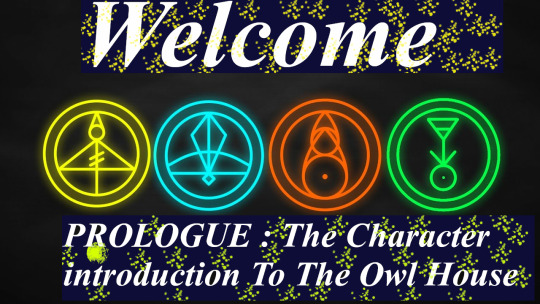
Hair representation matters in entertainment industry (including black people) Don’t ignore this.
Time to discuss People of color (POC)representation,
Why we need more Hairstyles, inspiration in media for culture.
It's time to debunk HERE I GO!!!
Hello To all the Lovely Stars & Space Voyagers, This is the Brown Sugar Queen Kyoko Cane Aka The Black Crystal Jem Of The Daystar Voyage, I am a Cosplayer, A Fabulous Blerd if you will who does Drag/perform, Making Creative content on platforms involving Family Entertainment Mostly with some variety in it.
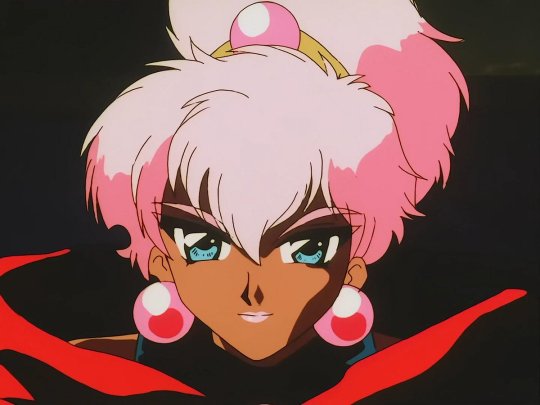
I come to talk about something that's been buzzing in my mind about a topic needing to get debunked & spoken about, IS POC REPRESENTATION & HAIRSTYLES IN MEDIA.
GOD POC REP MATTERS IN MEDIA MATTERS ( STOP ACTING LIKE IT DOESNT)
As a black Person Growing Up Myself, It has been a beautiful journey road being a proud African American man coming out as genderqueer, I always Found Comfort & love In My own Skin & even my Hair of all textures, first time I saw the ever Strong lightning goddess storm in the xmen series on fox kids made a great impact in my life in the early days of the 80s & 90s along other favorite shows back then however,
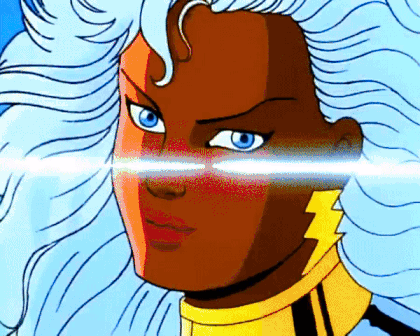
POC representation in the Future of Anime & western animation even in today's media has been distorted Or even limited on how we as black people are drawn. from caricatures To Stereotypes, or to follow a certain trend to make a profit from viewers & fans be it from influencers & popular media or just to be made Fun Of & Mocked, do to make a profit out of our black origins & History.
Example black character such as Usopp One piece.

however there have been great anime that have made our features positive one is Sol Bianca and others
Pokemon, Michiko Hatchin, Naruto & Carole And Tuesday.
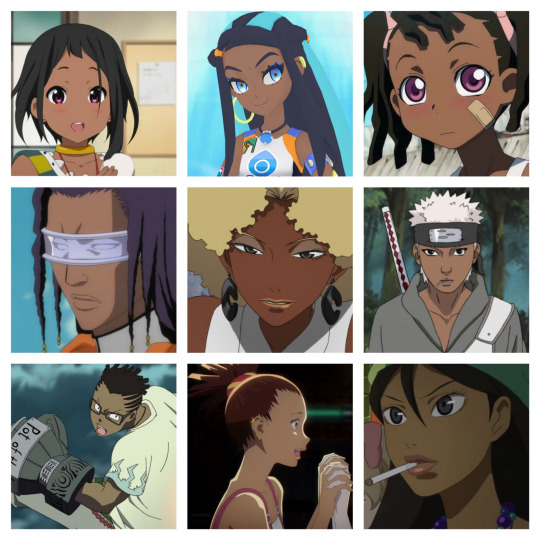
Just like In Real Life, We As black people come in so many textures and beautiful complexions as you see in all of animation, & black-owned magazines, such as essence and this one Called Jet in the 1920s through Now celebrating our great culture.

We As Blerds, Black Fans & Cosplayers should have good content in which we can express, & be uplifted by our skin Personality & meaning itself, No matter what background or environment to which we dress, or cosplay a character that's out of our skin tone.
we come so far to the point where we have great indie creators, cosplayers even compays from hair products blogs Manga & comic books.
I'm glad that we are coming into our own and doing better but there's still work to be done, on how Hollywood treats us, and until we see the next all-black piece of media that's when we make it
(Carole & Tuesday, afro samurai & Yusuke on netflix prime example)
NEXT SEGMENT
We need more Black Hairstyles in animation & we need it more than ever.
The Hair Style Topic, oh yes its no big surprise that hair controversy within media has sparked in outrage,or made in impact throughout, be it in and out of workplaces or in the entertainment industry, I do feel at times things could've been handled with care.
From what I've seen we have gotten 2 steps forward, 4 steps back situation of all the controversies coming from the killmonger haircut that's been sported, which is a limited stifled hairdo on how we are only presented and how our hair can be made into cause it's a following trend, Because this is not the only distinct hairsyle to have Iin animated media, A Half Cut Mop will Not do So Put some Soul Glo & Let It Grow.

NOW you may wonder why i decided to put this post of a Disney main character of afro Latina background, well Luz Noceda I feel has great growth coming out to her friends and chosen family, however doesn't change the fact they didn't do anything for her to show ethnic representation other than speak Spanish, Having to show that aggressive Spicy latina Archetype to a Degree, & have a black father mention in season 2, having given no origin story or closure.
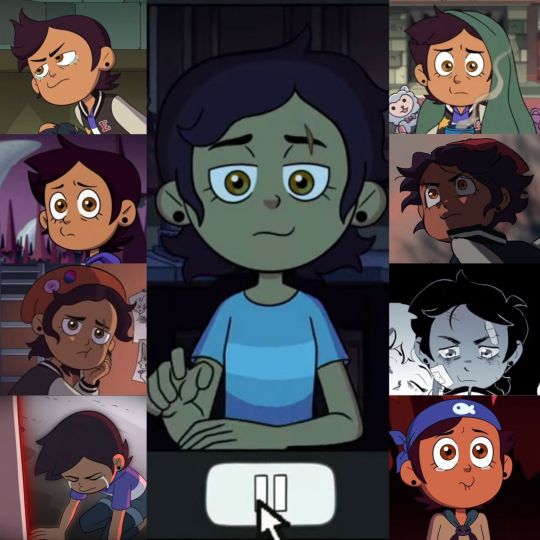
throughout the show this showed has shown great lgbt representation even though at times flawed, in the relationship area. ( another topic for a video COmING SOON) however the owl house has fall flat on ethnic & hair representation, Gus is a great example of a character being sidelined a lot too.
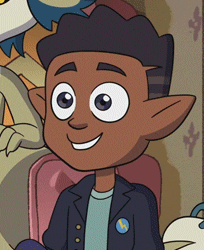
for instance luz noceda has been stifled into nothing but that pokemon goh knockoff haircut,
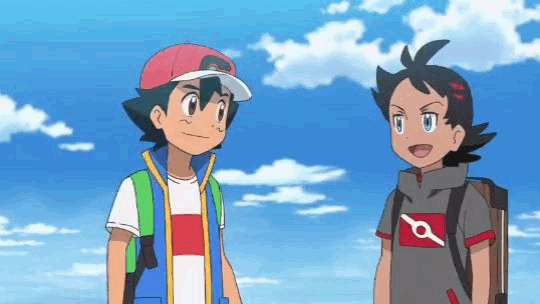
even though there may have been open-minded viewers,who agree on luz hair being styled effectively, making many statements that hair shows so many emotions in animation, Down below
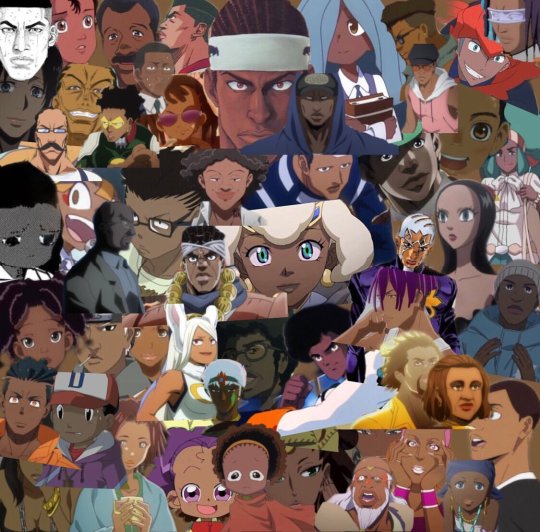
That all hair on poc characters is a good is how you pull it off, in the picture below there tons of great characters in many hairdos complementing them.
sometimes i wish luz character could have handled by poc staff, and have her own break out like the rest of the female characters, cause I kid you not, I met a lot of non-gender-conforming characters or people, who sport many hair designs. It infuriates me such a beautiful person Luz Batista find out the pilot that her character was somewhat sidelined due to the writing Problems & Shipping and I'm baffled how of course white staff members didn't do their research on Afro Latina her cause Luz is beautiful
Knowing other shows such as Moon Girl & Devil Dinosaur Do an incredible job of Discussing on how black hair is powerful, magical & comes in many shapes and intricate designs if you know what your doing and I for one have a graceful mother who a beautician coming from her,
We are in an era where black people shouldn't exist or we arent amount to anything and I too had my fair share of my hair being talked about in a nasty way,
This concludes the story post of how black representation should matter support shows out of mainstream like indie projects, cause there paving the way also a video post of my channel and The owl house debunk series thanks.
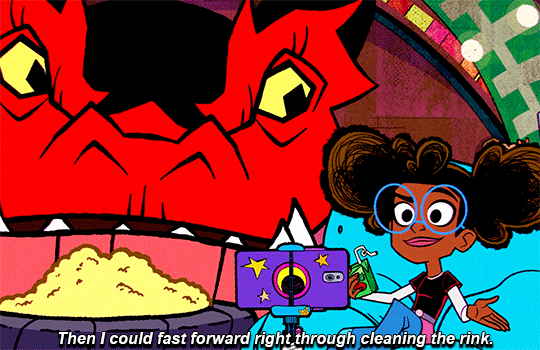
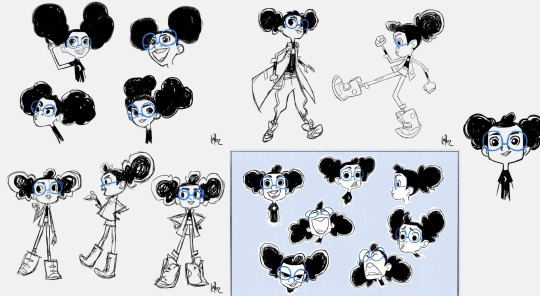
Now this is has been another topic post , right now getting ready for my epic momocon outing meeting Disney creators, and everything animation, hope everyone has a good one and all the links on good hair and my video post is here below, Have a Have a Nice Cruise & Stay Shining.
youtube
youtube
#toh gus#tohhunter#toh skara#toh critical#toh critic#toh criticism#toh spoilers#the owl house is flawed ok#theres a lack of ethnic representation in the owl house open your eyes#luz noceda#luz x amity#moon girl magic#moon girl and devil dinosaur#moon girl season 2#lunella lafayette#devil dinosaur#huntlow#lumity#black hair#black history month#amphibia#molly mcgee#disney has a white favortism problem#disney get better at being black come on#daystar voyage#kyoko cane#eda clawthorne#hooty#duolingo#toh cat
14 notes
·
View notes
Text
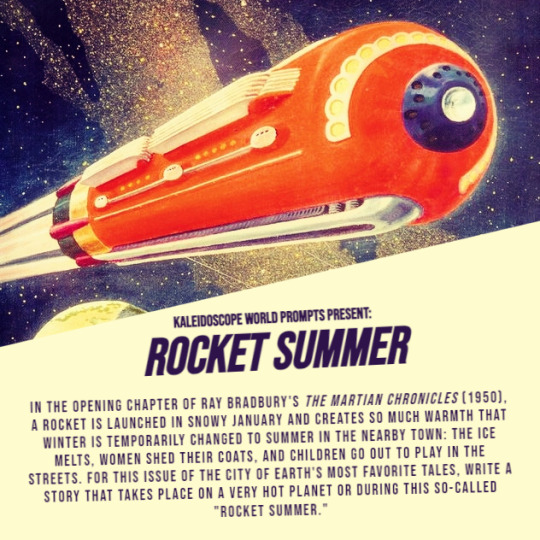
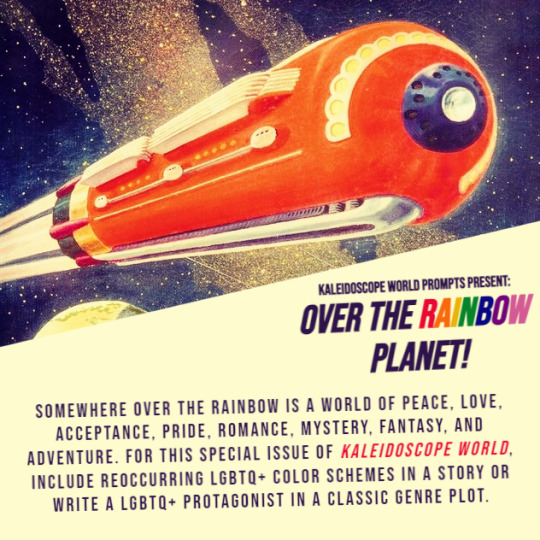
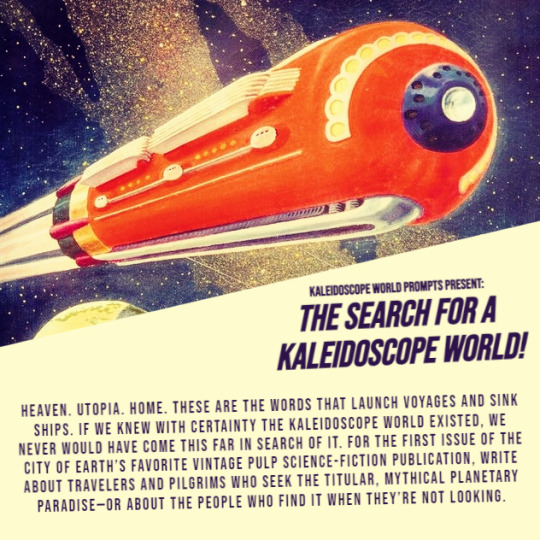
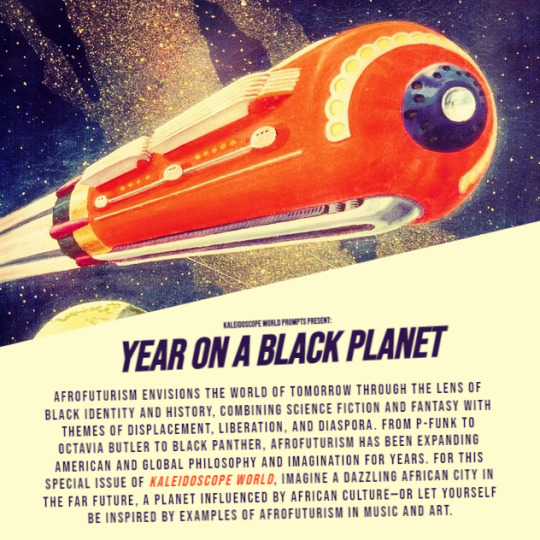
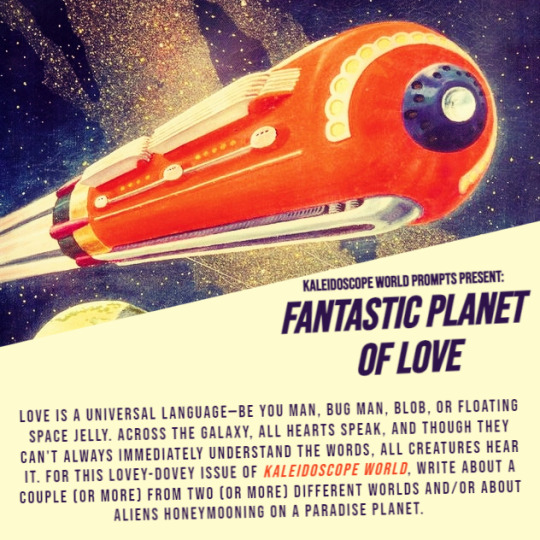
On Kaleidoscope World, we use prompts to inspire standalone science fiction and genre stories from our writers. In the context of our collaborative setting, we use these stories to populate a fictional magazine called—you guessed it!—Kaleidoscope World. However, as standalone writing prompts, they really could be used by anybody looking to create a thematic sci-fi story. Go wild! The prompts featured here include special Pride, Valentine's Day, and Black History Month topics. The full text of these will be under the cut for anyone needing it.
Theme: The Search for a Kaleidoscope World! Prompt: Heaven. Utopia. Home. These are the words that launch voyages and sink ships. If we knew with certainty the Kaleidoscope World existed, we never would have come this far in search of it. For the first issue of the city of Earth’s favorite vintage pulp science-fiction publication, write about travelers and pilgrims who seek the titular, mythical planetary paradise—or about the people who find it when they’re not looking. Theme: Over the Rainbow Planet Prompt: Somewhere over the rainbow is a world of peace, love, acceptance, pride, romance, mystery, fantasy, and adventure. For this special issue of Kaleidoscope World, include reoccurring LGBTQ+ color schemes in a story OR write a LGBTQ+ protagonist in a classic plot from any genre. Theme: Rocket Summer Prompt: In the opening chapter of Ray Bradbury's The Martian Chronicles (1950), a rocket is launched in snowy January and creates so much warmth that winter is temporarily changed to summer in the nearby town: the ice melts, women shed their coats, and children go out to play in the streets. For the third issue of the city of Earth's favorite tales, write a story that takes place in a very hot climate or during this so-called "Rocket Summer." Theme: Fantastic Planet of Love Prompt: Love is a universal language—be you man, bug man, blob, or floating space jelly. Across the galaxy, all hearts speak, and though they can't always immediately understand the words, all creatures hear it. For this lovey-dovey issue of Kaleidoscope World, write about a couple (or more) from two (or more) different worlds and/or about aliens visiting a paradise planet on their honeymoon or honeymoon equivalent. Theme: Year on a Black Planet Prompt: Afrofuturism envisions the world of tomorrow through the lens of Black identity and history, combining science fiction and fantasy with themes of displacement, liberation, and diaspora. From P-Funk to Octavia Butler to Black Panther, Afrofuturism has been expanding American and global philosophy and imagination for years. For this special issue of Kaleidoscope World, imagine a dazzling African city in the far future, a planet influenced by African culture—or let yourself be inspired by examples of Afrofuturism in music and art.
#writing prompts#sci-fi prompts#science fiction#science fiction rp#jcink rp#writing exercise#genre prompts#plot hooks#inspiration#writing ideas#writerscommunity#writers on tumblr#writers and poets#creative writing#romance writing#queer scifi#queer science fiction#afrofuturism#rp writing#retro scifi#scifi rp#scifi story#story writing#writing drabble#fiction writing#fiction prompts
9 notes
·
View notes
Text

VICTOR OLSON
True Adventures, October 1963
Ivan Victor Olson (August 4, 1924 - June 22, 2007) Victor Olson, of Fanton Meadows, West Redding, Connecticut was a well-known award-winning Fairfield County artist, as well as an illustrator and graphic designer. He has illustrated many national magazine covers for paperback publications and magazine stories for such publishers as Doubleday, Avon Books, MacFadden Books, Bantam and Monarch. He began exhibiting when he was attending Bassick High School in Bridgeport, showing his many works in various galleries. He attended Art Career School in New York City and worked in art studios, both in New York and Connecticut. Victor's portrait of Igor Sikorski was acquired by the Smithsonian Institute and hangs in their National Air and Space Museum in Washington, DC. He was commissioned by the Postal Commemorative Society to complete eighteen panels featuring famous explorers from Leif Erikson's voyage to Neil Armstrong's landing on the moon. One of Vic's paintings, an oil painting depicting a typical New England scene, is in the private collection of former President Lyndon B. Johnson. Victor presented a painting of Louis Armstrong to his wife Lucille Armstrong to be hung in the Louis Armstrong Museum in New York City. Locally he is known for many of his oil portraits, including those of former Bridgeport Mayors McLevy and Tedesco, as well as portraits of prominent people throughout the Fairfield County area.
5 notes
·
View notes
Text


[cis fem, she/her] Welcome to Aurora Bay, CLOVER NATELA. I couldn’t help but notice you look an awful lot like LUPITA NYONG’O. You must be the THIRTY SIX year old EDITOR AT UFOLOGY DISCLOSED MAGAZINE. Word is you’re HARD WORKING but can also be a bit OVER-OBSESSED and your favorite song is VOYAGER’S GOLDEN RECORD. I also heard you’ll be staying in OCEAN CREST. I’m sure you’ll love it!
Liene, 25, GMT+1, any pronouns
As a child, Clover often tagged along to her mothers work at the local public library where she exclusively was drawn to books about space. She could spend hours in the comfy chair reading about all of the planets and stars and learning about the workings of our galaxies and all they contain.
At the age of fourteen, the girlfriend of Clover's mom gifted her a flimsy telescope, picked out lovingly at the local mall. It became Clover's most priced possession, and from then on she'd gaze at the stars every night after school, as soon as it got dark enough in their backyard. She'd keep notebooks to write down what she observed, often including drawings of sky-maps and constellations.
One night, right after her fifteenth birthday, Clover looked up into the sky and three big lights hovered over her in a triangle position. It flew just a few meters over her house, slowly and soundless. The lights were there for almost fifteen minutes, before heading south and disappearing over the tall buildings on the edge of the city. Clover was left breathless and completely entranced by this phenomenon.
This was a prompt for Clover to read up about UFO-sightings. She would read anything she could get her hands on, set up regular observatory meetings with friends hoping to witness anything that would explain what she saw that one winter night. Eventually most friends would stop coming, but Clover remained, dutifully keeping up her notebooks and expanding on her research.
Clover would never lose her interest in sightings and in her mid-twenties would start a magazine by the name of UFO's Disclosed, in which she reports on any sightings or other UFO-related news. The magazine started out small, but quickly became an essential space to everyone who concerned themselves with any of the discussed topics. From the subscription fees alone Clover is able to sustain herself, travel around and do local research at hotspots. Through the years she's accidentally profiled herself as a sighting-hotline, and she's learned to pick out the interesting stories to be published in the magazine.
An other topic Clover starts covering more and more over the years, are interviews with and stories by alien abductees. She feels as though it is important stories concerning UFO's and alien experiences are factually recorded and made accessible for research.
The last couple of years, Clover has had her base in Aurora Bay after receiving multiple notifications of sightings around the place. She can often be found on the beach with her observation gear, where she has a clear view of the sky. She has rented a small office space too, where she can receive guests if she needs to, and where she has a small printing station to press the magazine. It gives her some peace of mind to be settled a bit more and not have to rely on local print shops and dodgy motels. She does rent a small apartment too, but she's hardly ever around there since most nights she is out to observe, and most days she ends up napping on her office couch.
Clover finds it very important to keep some sort of objectiveness concerning her reports. She tries to keep everything close to the facts, and close to peoples experiences. However, she'd never deny that she will always be biased because of her own sighting. She comes across phlegmatic, although most people would find her line of work to contradict this. Clover will always ask any question crossing her mind. She is confident, but can be too stubborn at times. Currently, Clover is working on a book about the particular type of sightings in the Aurora Bay area.
@aurorabayaesthetic
3 notes
·
View notes
Text
This story is inspired by my experience trying to foster long distance relationships during “Zoom University” and the bittersweet prospect of moving away from my friends after graduation. One of the post-doctorates in my lab group encouraged me to write this story for submission to Nature Futures, and though it didn’t get into that magazine (I mean come on, it’s Nature), I still wanted to share it with all of you on my little ol’ corner of the internet. Thank you for reading.
@carboninkwash you're the only one of my friends on tumblr that I can actually tag but this is dedicated to you.
32 notes
·
View notes
Text
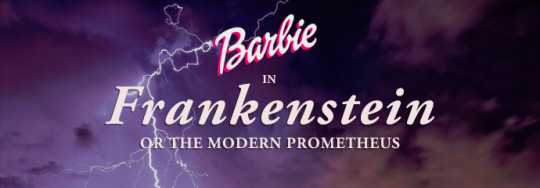
Kelly is nervous about her school grades, since she couldn't manage to dissect a frog in science class. Luckily for her, Barbie, her tutor, has just the right tale to motivate her to try harder and pass her exams -and, who knows, maybe even learn a valuable lesson…
CHAPTER 1
[ here for CHAPTER 2 ]
“What’s wrong, Kelly?” she asked.
It was a dark, stormy night in the small coastal town. The raindrops, harmless by themselves, violently struck the windowpanes of young Kelly’s house. She was sitting at her kitchen table, next to the large bay windows, so she felt surrounded by the unceasing, rattling sound. Kelly chewed on the end of her pencil, gazing at all the pages of her biology textbooks, feeling deeply upset. Barbie, in her usual cheery disposition, smiled at her.
“Oh, Barbie… Mom will be so angry when she finds out how I did today in science class.”
“How so? What happened?”
“We were asked to dissect a frog… And I just couldn’t do it.”
“Why? Were you sorry for the little frog?”
“Oh, no, of course not; it was dead already. I was just… A bit disgusted by the whole thing.”
Kelly’s tutor laughed. “But there’s nothing disgusting about it! It’s only natural to be curious about the inner workings of the marvelous machine that is the organic body.”
“But, Barbie –I didn’t need to slice the frog open! I could just buy a diagram or something of the sort, the kind that appears in those science magazines –or I could search for a video of someone else doing it on the internet���”
“Kelly,” Barbie laughed again. “That cannot replace the real experience of witnessing the real components that make up a living being.”
“I still think it’s icky…”
Suddenly, a flash of lightning startled Kelly, as she saw the whole room –the tall doors, the cabinet filled with her parents’ souvenirs of fascinating voyages, the textbooks and their illustrations of the nervous system, and Barbie herself –bleached in a bright, burning white before the darkness returned, interrupted only by the few candles that lighted the space. And, just as Kelly wondered when the light would come back so she could turn on the living room lamps, a loud booming thunder spooked her, and she let out a brief shriek.
“Why, why must it make that noise!” Kelly cried.
“Well,” Barbie started explaining. “Thunder is caused by the lightning, which opens an air channel—”
“I know how thunder and lightning works –I’m just tired of the bright flashes and the terrible booming! I wish I could stop them altogether!”
To her surprise, Barbie didn’t laugh. She just smiled bitterly, almost disappointed. It was not a normal look for her, and Kelly was just a little unnerved by it.
“The teacher said that if I don’t finish the science project, he will fail me. But I can’t fail this class –my parents will be fuming at the mere thought of it,” Kelly protested, and huffed. “All this because I wouldn’t cut up a little smelly frog.”
Barbie looked at her student for a few minutes, while the rain continued to pour outside. The candle that lighted her smooth features flickered, casting changing shadows on her. Finally, Barbie moved her chair closer to Kelly’s.
“I just want to pass this science exam,” the young girl said. “I don’t know why it’s become so difficult for me.”
“I know,” said Barbie. “You just need to try a little harder, and find the courage to overcome your disgust, leave your repugnance behind and get it done.”
Kelly looked down at the half done, messy drawing she had made, an attempt to illustrate the organs of a leopard frog. Without the actual physical model, she knew, she wouldn’t be able to finish it.
“This reminds me…” Barbie said slowly. “Of something I’ve heard about, some time ago… About a girl who felt much like you once –conflicted, about what was the right thing to do.”
Kelly blinked, intrigued. A new lightning struck, and thunder clapped again, but Kelly barely gritted her teeth. Barbie quickly glanced at the grandfather clock on the corner of the room –her shift would be over in a bit less than an hour –but if the story could help her young student, she thought, it would be worth spending the rest of the class telling it.
“Alright; this happened not so long ago, not so far from here…”
…
Vivianna Frankenstein was the eldest daughter of Dr Frankenstein, a respected scientist in a quiet, mysterious European town in Switzerland. She lived with her father, her little sister Marianna, and their servant boy Elliot in a beautiful, grand timber-framed house in the woods. Vivianna had tragically lost her mother, but she still had his loving father and sister, and the faithful servitude of Elliot, so she didn’t feel too bad about it. After her passing, Dr Frankenstein had given Vivianna his lovely golden locket, where her mother’s sweet face was forever immortalized. Wearing it, Vivianna felt her mother was always with her, in a certain way, dangling from her neck just over her heart.
Living in such a lavish house in such a quiet town meant that Vivianna didn’t have many chances to make friends –in fact, she was rather quiet herself, and found herself to be quite awkward among new people, much to her own chagrin. Despite this, she had three true friends –four, perhaps, if one counts a little sister as a friend: Henrika, Willard, and Matt.
Henrika, whom she considered her bestest friend, looked very much like Vivianna: their biggest differences were that Henrika was a brunette, while Vivianna had blonde hair; beyond that, both had clear blue eyes and a youthful, oval face. Henrika had been Vivianna’s closest friend since early childhood, and neither could imagine living without the other. They frequently spent time together, at sleepovers and museum visits, at the park or simply in each other’s bedrooms, singing their favorite songs, chatting away the hours and dreaming of their futures.
Willard, on the other hand, was a rat. He was Vivianna’s pet rat, who often tried to communicate with her owner with little high pitched squeaks and squeals that most people besides Vivianna felt were pretty annoying. Willard was a chubby rat, mostly due to the privileged life at the Frankenstein’s home, but he was still very much nimble and quick on his tiny feet. Vivianna loved him dearly, almost as much as she loved Henrika: she fed him cashew and pecans, stroked his soft fur every now and then to show him her affection, and kept him safe in her dollhouse besides her bed when Dr Frankenstein wished to spend a peaceful evening.
Matthew, or Matt for short, finally, was a chap around Vivianna’s age, an orphan who Mrs Frankenstein had adopted once while she was travelling somewhere other than Europe. She had chosen Matt from several other boys –street urchins, living without food or shelter –when she realized he was the most likely of the bunch to grow to be a handsome young man, the cleanest one and the least sick and scarred. Matt lived with the Frankensteins for a while, as a surrogate brother to Vivianna. After Marianna’s birth, though, and especially after Mrs Frankenstein’s death, Matt was sent to live with his personal tutor in a cottage not far from the family’s house, paid by the Frankensteins, to complete his education without distractions. It was Dr Frankenstein’s plan, and one he had shared with his wife for quite some time, for Matt to marry Vivianna one day. Mrs Frankenstein often remarked what a lovely couple they would be; neither of the children were particularly interested in the other in a romantic sense, but they liked each other well enough, and had no problem playing together and spending play dates and evenings along with Henrika, going to the movies, having ice creams, hiking in the woods, performing little amateur productions of Greek myths, and the like.
Vivianna had grown into a gorgeous young woman by the time this story properly begins: and like all young women, she had a particular interest that concentrated all her time and attention: sewing. She was an extremely skilled seamstress, capable of reconstructing complex historical costumes and fixing almost every piece of clothing that ever appeared to have a tear, a hole or a ripped seam. But –and this she kept a secret –she had another interest –something unheard of: Vivianna was fascinated by science, the science her father dedicated his life to. Despite her evident passion for the textile arts, she read science books by candlelight, covered by the dark of night. Vivianna knew that people wouldn’t understand her love of science –nobody would believe a pretty, nice, blonde, gown-wearing lady would find herself riveted by beakers, pipettes, funnels and all that sort of stuff.
Vivianna was especially interested in her father’s greatest creation: an advanced piece of machinery, full of cogs and screws and gears, which could accurately predict the weather in no time. The townsfolk, confounded by his invention, called the machine the Rainmaker, and believed it to be magic. Vivianna felt the same way her father did –a sort of light amusement at the beliefs of the common people, of those who still insisted that the device was a scam and that it was Dr Frankenstein who summoned the clouds and the storms.
These people stopped saying so, when Dr Frankenstein died suddenly during a fine summer afternoon. He was taking a walk when he was surprised by a light drizzle –not even something that merited pulling up his collar –and he continued his promenade by the countryside when a lightning struck him and killed him instantly. Vivianna and Marianna found themselves orphaned, and they mourned their dear father for the appropriate amount of time, confining themselves to their home, to the sympathetic company of Henrika and Matt, to the service of the similarly grieving Elliot, who considered Dr Frankenstein the father he never had. Nothing much had truly changed, after a while, just the amount of rooms in the great house that were inhabited.
Vivianna considered the death of his father her call to adventure: she suddenly felt the uncontainable need to travel, to see the world, to leave her quiet town and seek excitement and new experiences. So, one sunny morning, Vivianna packed her bags, gave Marianna a hug and her golden locket, and left her known world to pursue a higher education. She promised Marianna, Henrika and Matt to write as often as she could, once she found a good place to settle for a while. Undeniably, Vivianna felt a pit in her stomach to think that she wouldn’t continue with her familiar routines, that she wouldn’t see her dear friend Henrika’s face for some time, but Willard her pet rat squeaked excitedly in her travel satchel, and so, even without her mother’s locket, Vivianna felt less alone.
…
While on her journey, stopping from time to time to darn a hole in a sock and to see the wonderful views her unnamed homeland had to offer her, Vivianna continued her reading and studying of the sciences: she annotated her ideas and thoughts in a little leather-bound notepad, which she could safely close so Willard wouldn’t nibble at the edges. During one of her stops at a charming little roadside hotel, by the light of a full moon, she thought of her father’s untimely death, her mother’s tragic demise, and wondered about the limits of science –that which the townfolk considered magic. Vivianna tossed and turned, thinking about doing the impossible –of deciding to do that which others would consider a miracle, that which would bring her the respect and admiration she so dearly desired. Unable to sleep, she scribbled her thoughts on her notepad, added a little P.S. to her latest letter to Henrika, and pulled Willard closer to her, feeling his little heart beating fast under his furry pelt, and went on dreaming wide awake, wondering and pondering. On her nightstand, written hastily on the open pages of her notepad, one could read “bring the dead to life?”
…
She was still quite lucky, despite all. Vivianna soon found herself in a bustling city known for its prestigious science academies, and overjoyed at finding what she was searching for so long, she immediately paid the extremely high tuition and attended all the classes she thought were instrumental to her learning all that was necessary to pursue and fulfill her dream of doing the impossible. As much as she wished to share it with all, Vivianna kept her project to herself, thinking that doing otherwise could be quite detrimental –as she felt her ideas would be shunned, her opinions mocked, and ultimately be left without the needed resources to complete her vision. And so, she kept her thoughts and her words to herself, barely speaking in class beyond answering science-related questions and providing excuses as to why she had a curious, high-pitched-sounding bulge on her satchel in which she had to drop several raisins every now and then.
Her refusal to socialize worked perfectly, and nobody ever bothered her with questions, or even with greetings. Vivianna Frankenstein, of course, was still seen as the beautiful, slender, well dressed blonde beauty everyone recognized by her famous surname and high social standing, but as the days went on she became a mysterious figure, silent and single-minded, writing the hours away, using her voice only to show off her quickly growing knowledge and to, as some said, chat quietly with her satchel when she thought nobody was looking. Not even the mean girls at the academy could bother her: she ignored their rumors, their jealous gossip, the slander they tried to spread across the students. Some said she had killed her own parents; some said she sewed her own clothes, like a pauper would; some said she was engaged in illegal activities, that she trafficked organs and that she laid with the dead; some said she could talk to rats. But her striking beauty –since as she grew older, her loveliness only grew as well –protected her from people truly believing the malicious comments said behind her back and to her face. No one, however, could deny that she was working on something, and the question was no more who was she, but whatever she was building in her dorm.
Vivianna, indeed, was building experiments –more complex versions of the simulacra done in the science classes. She tampered with several types of chemicals and alternated electricity and heat to produce a formula that could bring her the certainty she needed to conduct her ultimate experiment. Sometimes, very rarely, she interviewed and questioned the professors on different, difficult subjects, but never gave a straight answer when she herself was questioned. The letters to Henrika and to Matt and Marianna came out of her dorm every week, and every week their letters entered through the thin space between the door of her dorm and the floor. When one of the most jealous girls managed to steal one of these letters, she woke up the next morning with all her clothes nibbled, ripped and torn, with the bottom of her closet mysteriously sprinkled with what seemed to be rat feces. She attempted to denounce Vivianna as the one who vandalized her dorm, but to no avail. Vivianna was soon such an unstoppable force at the science academy that after that particular incident, by necessity, the rumors quieted down and her name because taboo during lunch breaks and spare time. Everyone became afraid of her. Vivianna, so absorbed by her work, could barely register this as a change in her new routine.
…
It was during a storm –however much stronger than that in which her father had died –that Vivianna felt prepared to go ahead with her ultimate experiment, having found what she believed were the essential elements to achieve her goal. Willard clawed at her shoulder, his little whiskers trembling with anticipation. It was past midnight on a weekday, and as such the other students were surely all fast asleep.
Vivianna tied her hair on a neat braid bun, put on her carefully sewn baby blue apron –made to fit her perfectly, made to avoid any suspicious stains on her regular clothes –and slipped her manicured fingers into the washable, custom-fitted gloves she had prepared for her more “hands-on” parts of her project. She left Willard by her side, next to the clock, with a little plate with plenty of nuts for him to snack when he saw fit. Vivianna hadn’t eaten in quite a few days. And, if the assembling of the parts of her project was going to be as arduous as she expected it to be, she figured there would be few chances to stop and feed her little friend.
The work started, and it indeed took her a lot of effort and several hours; but when the work was finished, and the experiment was ready to begin in earnest, she felt a pride Vivianna hadn’t felt in quite some time. She took a moment to breathe deeply, to smile and think of her achievements, of Henrika’s marveled expression, of Matt and Marianna’s admiration, of her triumph over death. And so, she brought the lighting and the fire into her darkened dorm room. The creature she had delicately laid upon the bed, wrapped with leftover strips of spare fabric, tied all together and perfectly measured to conform to Vivianna’s desires, was pierced by needles connected to wires, connected to batteries, loaded to their full capacities. Light flashed as the creature, the human-like figure which almost seemed to be sleeping in that stormy, violent dawn, was shocked into reaction. In conjunction with the prepared chemicals and the carefully applied heat, there was sizzling and buzzing, smoke and tears from Vivianna’s weary eyes, screeched from the terrified Willard, and the final, almost explosive roar of thunder, when the batteries and the needles and the tubes all burst with one last, dramatic shower of sparks.
All quieted down. Silence and darkness returned, and Vivianna, with trembling fingers, lit up a single candle. She picked up Willard and put him on her shoulder, and he quickly nested against her neck, seeking her comfort. Vivianna ignored him. She took her candle closer to her creation –and before even being able to take a proper look at it, she adverted how the chest expanded as it took its first deep breath –and how its eyes opened, suddenly, like curtains being swiftly pulled up.
“It’s alive,” she whispered to Willard, or perhaps to herself.
But Vivianna was not overjoyed. She was not proud. And she was not happy at all. As soon as she could see what she had done, what she had brought to life, she recoiled in disgust and withdrew the light from it, as if, in darkness, it would disappear like a child’s nightmare.
Vivianna had attempted to make her creature in her image: she sought, as she was brought up, only the most delicate and striking beauty. She saw no reason as to give life to a being devoid of pleasant features, of perfectly shaped limbs, of the most perfect pieces she could manage to get her hands on. And so, Vivianna had fished her parts from very select places: the most cared-for, elite parts of the cemetery, where models and actresses were buried as they left too soon, too young; the dumpsters of shopping malls and large stores, where the broken mannequins were disposed of, but which could still be of use. She had washed everything so meticulously, taking the grime and the blood from nails, from crevices, better than the most professional mortician. Vivianna had used her sewing skills to attach the disparate limbs, to select and put together those fingers she found the nimblest, the lips she found the fullest, the feet she found the daintiest. When good parts were not available, that’s when the mannequins came of aid. She used heat to melt the plastic of the mannequin parts into the flesh, to attach everything neatly, cleanly, perfectly. Perfectly. Vivianna had never worked on anything as much, with as much attention to detail, with so much effort and hope. In her mind, the creature –her very own doll –would be perfect.
Perfect! Her own creation, perfect! As the heat of life animated the body, the seams became evident, the lines between skin and plastic. The scars of the stitching, that which Vivianna had done by hand, had not healed as well as she had expected; a newly beating heart pounded blood into the veins, and that blood leaked and dripped slowly through the badly sealed holes of the doll’s body. And beyond the skin… Vivianna felt sick to her stomach. She had attempted, in her pursuit of perfection, to copy herself –but even better, even more beautiful, with all those features Vivianna wished would be enhanced. But in her pursuit, the body’s proportions were extreme and deeply uncanny. It was all about small, off measurements: the bust, slightly too big for any human; the waist, just a bit too small, small enough to be wasp-like; the length of the legs, leaning toward the monstrous. And the features –the huge, blue, glassy eyes, surrounded by long, full lashes; the full, reddened, vein-crossed lips, which the doll could barely open in a forced pout; the tiny, thin nose, through which the doll tried its best to breathe; and the full head of blonde hair which, in the process had burned in places, or had become dirty and frizzy and greasy and stringy. Perhaps, Vivianna managed to think, it was what the magic of animation did to her creature: as a still figure, much like a mannequin, it could be slightly unsettling but, all things considered, a thing of beauty; but in the flesh, moving like –or how it imagined like –a person would move –something was so terribly off in how it moved, in how the body reacted to the movement, in how everything was placed and tried to place itself in the space.
The doll tried to sit on the bed –tried to arch its back and lean forward properly, slowly, and bend its long legs; but something went wrong in its calculations, and it fell to the floor. Vivianna gasped and retreated, feeling Willard’s claws sinking deeper into her shoulder. Then the doll managed to open its plump mouth and let out a noise –a hoarse, painful sound –and Vivianna could not take it any further. She flung open her dorm room door, ran through the hall, got out of the building, reached the street, and continued running, despite the rain, despite the thunder, despite the lightning, despite the heaviness that the water gave her as it soaked her baby blue apron, her neatly tied hair, her puffy sleeved pink blouse, her full navy skirt, her lace-trimmed petticoat, and as the mud slowed her patent-leather kitten heel shoes. Vivianna felt the weight on her, felt her damp hair covering the tiny, warm, trembling body of Willard still fixed upon her shoulder, she felt how she was slowed down, but she did not stop running.
…
Vivianna woke up in her underdress, lying on mint green silk sheets, her feet clean from mud and her face no longer cold and wet. She blinked, trying to recognize her surroundings. There was the crackling of fire, and a warm, cozy feeling, and smell of fresh bread. She wondered if she had died and this was heaven. Then she managed to focus her eyes, and saw the fireplace in the bedroom where she was in, with the rich velvet curtains drawn, the mahogany furniture neatly set against the white walls, and on the nightstand next to her, Willard, all puffed and dried and clean, too, nibbling on an assortment of nuts set aside in a small glass bowl for him.
Vivianna sat in the bed, trying to remember what happened. She remembered the rain, the fear clouding her mind, the ghastly feeling of air not entering her lungs. Then she recalled the darkness of her dorm room, and the sparks and the flashes of white light, and the flickering of a candle flame as it revealed such a horrible vision…
The door opened and Vivianna jumped and tensed. To her surprise, Henrika, of all people, entered the bedroom with a large smile and carrying a silver tray loaded with a full breakfast. Vivianna sighed in relief, and relaxed her shoulders. Henrika looked even more beautiful than ever, in the golden light of the hearth, in a long, silky white nightdress. Vivianna returned her smile. Henrika still tied up her hair like before, almost well enough, but with thin strands of hair lying everywhere, framing her face in such a lovely way.
“Good morning,” said Henrika. “Or actually, good afternoon. Did you manage to rest?”
“What happened? Where am I?”
“I was going to pay you a visit, but then I found you halfway there,” Henrika smiled, carefully setting the silver tray on Vivianna’s lap. “You were so exhausted you could barely walk, you could barely open your eyes. I caught you before you fell to the ground. So I took you here, to my home in the city –you know I know how to take care of you.”
Willard squeaked happily. Henrika laughed. “Yes, and I know how to take care of you too.”
“I didn’t know you had a home in the city…” said Vivianna, wanting to have her breakfast, but still not willing to let Henrika out of her sight, still wanting to hear her dearly missed voice.
“I told you about it in my last letter –you haven’t been answering them, lately,” said Henrika. “Neither Marianna’s letters, nor Matt’s –I still keep in touch with them, my beloved childhood friends; we meet every week, and we talk about how you have grown apart. We all missed you so much, Vivianna. It’s not the same without you.”
“Oh, Henrika…” moaned Vivianna, sinking her head in the pillow. “I’ve been absorbed with such a useless project… I have wasted so much time to something so awful…”
“No, no, Vivianna, don’t concern yourself with that,” said Henrika, sitting beside her on the bed. “You look so tired, so distressed… Please, for your own sake, rest. Have something good to eat. Talk to me, have someone to talk to… Besides Willard, I mean –I won’t argue he’s a great companion, but…”
Willard gave Henrika’s hand a playful bite. Vivianna smiled.
“Thank you so, so much for giving us shelter during this storm, Henrika… We… I have missed you too, so much, so often.”
Henrika smiled back at her. She leaned in and kissed her cheek.
“Now you’re home. You don’t have to worry anymore.”
Henrika stood up and turned around to leave. Vivianna almost called her back, not wanting her to leave just yet –somehow afraid that she had imagined Henrika, this whole scene, this whole situation that, after such horrors, seemed too good to be true. Henrika then turned backward, and smiled once more, her bright beautiful smile.
“Now eat! You look positively emaciated.”
Vivianna smiled. She turned her attention down to the tray –there was golden-brown toasted bread, apple juice, cookies and tea with milk, honey and sugar all at her disposition. Vivianna felt as if she was back at her home in her little quiet town, back in her childhood, and wondered why she ever wished to leave all that which she loved.
…
Vivianna rested on Henrika’s bed for a few days, but soon, as long as she wasn’t asked anything about the night of the storm, she regained her cheerful disposition. Henrika’s home became her home too, where she ate and slept and spent most of the time, as it was a rainy season indeed, and the mere sound of the raindrops sputtering against the windows during strong winds could set Vivianna on edge, make her tremble, and made Henrika fear strongly for her friend.
“Please, my dear –what is it that hurts you so much? Why the rain, why these sounds, that used to be so natural in the past, have become such a source of terror to you?” asked Henrika, when she couldn’t keep quiet about it any longer. “Please, Vivianna, my dearest friend, my love –just tell me!”
“I can’t –please, please, I can’t!” cried Vivianna in response, and Henrika knew that there was no use. All she could do, then, she concluded, was to help her friend get through these painful moments, and be there to comfort her.
Some days she would find Vivianna locked up in the room, with Willard resting on her neck, covered in the green sheets, deep in thought, with her eyes lost somewhere far away. Those days Henrika would leave her be, and spent these hours on the verge of tears, wondering what had happened to her friend that had changed her so dramatically. Other days Vivianna would be perfectly happy but absolutely nervous, her eyes darting to each window, each door, as if expecting some kind of ghost to materialize and assault her. At least, Henrika thought, these days Vivianna would talk, and they would sew together, and chat and everything would be like before again. But the bad days outnumbered the bad, and finally, one sleepless night, Vivianna’s cries were more than what Henrika could bear. She entered the dark bedroom where Vivianna was, curled against a fidgety Willard. At first Vivianna tensed and held her breath, but when she recognized her friend in the dim moonlight, she sighed, once more, and laid her head down.
“I’m sorry… Did I wake you up?” asked Vivianna.
“No, it’s alright… I just wanted to know how you’re doing.”
Henrika kneeled next to the bed. Willard climbed out of the bed and onto her shoulder, and Henrika petted her for a while. Vivianna smiled.
“Here I am. Better than before… I hope worse than tomorrow.”
Henrika returned the smile. “You’ll get better. I know it. After your father died, I was really amazed… When my own mother died, when I was a child, I was a bit like you now… I didn’t want to leave my bed.”
“Really?” asked Vivianna. “How did you manage to leave, then?”
“I had you,” answered Henrika. “And Marianna. And Matt, and Elliot… I had all of you to help me get through.”
“I miss Marianna, and Matt, and… Yes, Elliot. I miss them all,” said Vivianna. “I miss when we were children, and we would all play together, and things seemed to be so easy and simple…”
“I know,” said Henrika, and she held Vivianna’s hand. “But this is our life, now. There’s no going back, so… I guess we should get used to this new situation.”
Vivianna nodded. Henrika held Willard and set him on the nightstand, on a little pillow left there for him to sleep –both Henrika and Vivianna knew that Willard did love his owner, but was not a plush toy to always keep by her side.
“Could you… Stay, please?” asked Vivianna. “Here, with me? Tonight?”
“Of course. That’s what I came for.”
“Thank you.”
Henrika rested her head against Vivianna’s bed, still holding her hand. After a few seconds, Vivianna squeezed her friend’s hand.
“Wouldn’t you rather…?”
Henrika smiled, and climbed into bed with her. Vivianna closed her eyes and let Henrika embrace her and rest her head next to her neck. It was much different than the little warmth that Willard was able to give her. There was something special in the pressure of Henrika’s arms around her, in the soft breathing on her nape, and the feeling of her, just her, near her. It brought memories of sleepovers, of secrets whispered under sheets, of stories shared as they began to yawn and try to stay awake a few minutes more. It made Vivianna so happy that, for a moment, she managed to erase the stormy night from her mind and focus on the love she felt.
…
After that night, Vivianna tried her best to get better. She went along Henrika on her morning strolls, they ate together and spent their time doing more or less the same things they did as children: they staged their favorite plays in the drawing room, they sang and drew and painted and played pirates and, even if they didn’t have Marianne and Matt as their playmates to complete the group, they found themselves truly enjoying playing by themselves. Henrika showed Vivianna her talents at the piano, while Vivianna sang by her friend’s side, and sometimes, suddenly interrupting their strolls, they ran races on the streets, often just because Henrika knew how Vivianna liked competitions and also because Vivianna knew that Henrika wanted her to recover her strength, and even if she often felt tired, she also wanted Henrika to be proud of her, to make her happy. So day by day, night by night, they recovered the time they had lost since Vivianna left her hometown, and Vivianna recovered her enthusiasm and her health.
As autumn neared, Henrika invited Vivianna to her father’s winter retreat –a little cabin in the country, where Henrika used to spend many holidays. Vivianna, of course, accepted. She felt truly glad, despite all her improvement, to get away from the city. The changing color of the leaves made her realize how time truly passed, and how much she had changed, compared to the naïve girl she used to be. Having gone through so much, and still come out on the other side, have her hope for the future.
“You seem to be you again,” said Henrika, one afternoon during their evening walk.
“What do you mean?”
“I mean, I see you smiling a lot more often. You laugh more. You have a warmer color on your cheeks, your hair is brighter… All of you, is brighter. I don’t know if that makes sense…” Henrika chuckled.
“I understand. I do feel…” And Vivianna laughed, too. “Brighter, I guess.”
They continued walking, silently. Sometimes silence felt right, curiously. Vivianne felt these silences differently than the ones she devoutly maintained at the science academy: it felt peaceful, as if some thoughts were better kept and developed by oneself, until it felt right to voice them. It became a way to be alone and at peace, in each other company.
Out of the blue, Vivianna smiled and sprinted, running through the field. She heard Henrika laughing behind her, and her quick steps on the drying grass. And as she kept running, feeling free without the crowds and noise of the city streets, she heard a soft rumble –a drop on her nose –and rain began to pour down, and Vivianna, almost instantly, slowed down and grinded to a halt.
“Viv?” asked Henrika, a few meters behind.
Vivianna breathed deeply, trying to focus on the field and the trees and the horizon, instead of the sound of the rain, the weight of the water as it pulled her down into the mud, and when the lightning lit up the sky, Henrika crashed against Vivianna in a firm embrace.
“Viv, my dear, please, it’s alright,” said Henrika, quietly, into her ear. “It’s alright.”
Vivianna looked up to the sky. The rain kept falling, getting into her eyes, and nothing else happened, and she felt her clothes getting heavier, and finding it difficult to breathe, but still, nothing else happened. She looked around. There was no one else in the field, besides her and Henrika. Vivianna turned around and looked at her friend’s face. Her dark hair had become undone, and her face was soaking wet, and her face had slightly reddened after the effort of the run. Vivianna moved aside the strands of hair that stuck to her neck and temples. They gazed into each other’s eyes for a moment, as they tried to see if the other was crying, which of them needed reassurance. And, at last, Vivianna embraced Henrika and kissed her, just as another flash of lightning struck, and somewhere, in the fields behind them, a tree caught on fire.
…
As Vivianna’s health seemed to be restored, they received a letter from Matt, their old childhood friend. Both her and Henrika were overjoyed to hear from him again, and swiftly answered his letter with an invitation to visit them. Vivianna smiled, stroking Willard’s fur, thinking of the three of them being together again, after so long.
Matt arrived one fine crisp morning, along with a clear blue sky. During the years they had been apart, Matt had become quite the handsome young man, just like Vivianna’s mother had expected. He had become tall, even taller than her, and his fair curls framed his boyish face as if it was of a statue of a cherub in a church. Vivianna had always felt Matt was somehow angelic, whether in his gesture or his attitude: he had an infinite patience, an elegance perfected by years of fine schooling, and being alongside him made one feel either deeply at peace, knowing someone so gentle, or a powerful guilt, knowing one would never be as virtuous as him. He inspired a profound trust in anyone who met him, and ever since they were children and Matt became sort of a surrogate brother, Vivianna saw him unable of committing a single crime of mischief. At their age, after all she had been through, Vivianna couldn’t help but feel even less deserving of his friendship, of his smiles; she knew something awful, and despite his kindness, nothing promised her that he would ever understand the reasons she did what she did.
Much like in the old days, Matt greeted her friends with a tight hug. Smiling wide, Matt looked at Vivianna up and down.
“My, Vivianna, how you’ve changed in these few years,” said Matt. “Where have you been hiding for so long?”
“I’ve been studying,” said Vivianna, lifting her chin. “What have you been doing?”
“I’ve been studying, too. It’s only our dear Henrika who has been living the bohemian way.”
“At least I’ve had fun,” she replied playfully. “You both seemed to have been through the wringer of years of scheduled learning.”
“I know you surely found other ways to keep you entertained,” said Matt. “Well, what are we waiting for? Aren't you ready to go back home, Vivianna?”
“What do you mean?”
Matt frowned. “I mean back to your sister, Marianna. She has grown so much since you last saw her… I still frequent the house, where Elliot is caring for Marianna, for the home, for –well, everything. But…” he said, as he reached and held Vivianna’s hand. “She’s so anxious for you to come home. You are the eldest of the Frankensteins, you are all the family she’s got.”
“Oh, she’s got Elliot to keep her company,” said Vivianna, avoiding his gaze.
“Viv, you know Marianna loves you deeply. And I daresay, I think you once loved her too. But it’s been so long I don’t think you remember that you do.”
“I’ve got my own issues to resolve. I cannot take care of a child now, not when I still have to finish my studies, when I—”
“I haven’t come to nag you into returning,” interrupted Matt, softly. “Please don’t take this the wrong way. I just wanted you to know that I’ve been at the Frankenstein’s home, I’ve been talking with Elliot, and with Marianna, and that you should know what’s happening back there beyond what the letters say.”
“If Marianna wanted me back, she would have simply told me,” said Vivianna, hiding the fact that her younger sister had effectively asked her to come home, several times, in almost every single letter. But the idea of returning home and having to care for her –having to play the role of the mother, now that both their parents were gone –made her terrified. As much as she missed the old times, she did not feel able to set a foot back in her house.
“Let’s not talk about unpleasant things,” said Henrika. “Autumn is already here. It’s time to spend time together, eat hearty meals, and enjoy the life that nature is clinging on to. Later, during the winter, we can go on and face whatever is that troubles us. Right now, life is for living it.”
Vivianna smiled, glad that Henrika had covered for her. Matt, not wanting to argue with her old friends, sighed quietly and nodded.
The three of them spent many wonderful weeks together, waking up to the smell of freshly baked bread, enjoying the gentle crunching of the golden fallen leaves during their walks in the woods, and having nightly concertos in the drawing room, where Henrika played her piano, Matt played his violin, and Vivianna sang in a clear, merry voice. And when they left for bed, around midnight, Vivianna looked into the tired but blissful faces of her friends, and hoped these moments lasted forever, and that winter never came.
…
During the first snowy morning, Matt said his goodbyes, kissed each of his friends on the cheek and left to return to his home and his studies. Before parting ways, Vivianna, still guilty by the words he had said to her, had promised Matt that he, Henrika and herself would return, together, to the Frankenstein house for the holidays, as a surprise to young Marianna. Matt had smiled widely and agreed that it was a wonderful idea, and so the plan was made, and a date was set. Hearing this, Henrika, proud of her, had kissed her sweetly and squeezed her hand. She knew that it was a big decision for Vivianna, and she knew that she had nothing but support from Henrika.
As the winter settled in the woods, covering everything with its white and silver mantle, the regular walks became less regular, and soon Vivianna and Henrika spent more time at home, cuddling together under warm blankets, drinking hot tea and chocolate, and singing during the cold, dark nights. The cold and the foggy windows made Vivianna feel like the little cabin in the woods had become still in time, frozen like if inside a little snow globe. She made an active effort to avoid looking at the calendar, avoid counting the days to return. Letters from Marianna became less frequent, until one came, not in her usual small powder blue envelopes –but in a rough beige paper, with the address coarsely scribbled on.
Vivianna frowned when she saw it, wondering who had written it. As she tore it open, while Henrika lounged and read on the chaise-longue, she realized it was Elliot’s. His handwriting was somewhat lacking, but still, it was not too difficult to understand. She began to read it rather uninterestedly, expecting there to be a petition for more money or the like; but as Vivianna continued reading, the words became messy, the paragraphs less neat, and soon the sentences seemed to spill out of the page, leaning downwards, the ink blotting and speckling the last inches of the coarse paper. She left the letter on her lap. Henrika raised her eyes from the book and asked her what had happened. Vivianna was unable to answer. Henrika left her book and walked to her, insisting, nervous. Vivianna then raised her own watery eyes to her. Henrika took the letter. She read it quickly, and dropped it in shock, and covered her mouth to stifle a cry.
Marianna was dead. She had been strangled and killed, while walking on the woods near the Frankenstein home. Marianna knew these woods perfectly well, and used to spend her lonely afternoons searching for butterflies, beetles and other fascinating bugs to add to the collection that had been spreading to the rest of the large and many rooms that were empty after her family had left her. Elliot said that he had called her to dinner, but when she did not come, he set out to look for her; he had found the golden locket Marianna never parted with, and became afraid for her; he followed the path marked by her small footprints on the mud, and found her body lying next to a tree, eyes wide awake, with the killer’s blue-hued hand markings on her neck. He had cried and screamed, embracing the child, wetting her golden locks with his tears. Elliot then called the authorities, back from the house, having left Marianna’s corpse where it was, unwilling to touch it again –as the body had slowly become colder and stiffer.
Elliot asked Vivianna to return, to pay her respects at the funeral, and to help with the legal proceedings. Vivianna felt once again unable to do so; she could not bear to see her younger sister's face, still forever, the colors of life taken so soon from her. But Henrika told her she would be by her side, and that she would support her, no matter what. As soon as he heard, Matt sent them a letter promising to be at the funeral, to pay his respects and help say goodbye to the poor child.
Vivianna and Henrika arrived to the Frankenstein house during a steely-sky morning, where the cold winds were so strong it nipped at their lips and noses. Vivianna, still in shock, could not find in her the tears to shed. Willard, nestled in her black coat pocket, wrapped itself on to her hand, warming her as only he could. Henrika held her other hand, squeezing it tightly, a bit for comfort and a bit to keep her present. Henrika could not possibly imagine what it was like, to lose everyone in her family. She kissed Vivianna’s temple to give her strength, and both entered the grand doors back to the imposing house.
The funeral was a quiet, solemn affair. Very few people attended –Marianna did not know many people, as she mostly stayed at home –and Matt and Henrika did not know how to talk to Vivianna, such a state she was in. After the lawyers, the governesses and the reporters left, Matt offered to prepare some tea. Henrika and Matt had a light meal on the main drawing room. Vivianna could not take a bite of anything. She walked up the stairs and wandered the rooms of her house, as the light faded in the twilight and the whole place sank into soft violets and blues. Vivianna didn’t turn on a single light; to her surprise, she knew exactly where everything was, even in the dark. She had forgotten nothing.
Vivianna entered her old bedroom. Her bed was made, her desk exactly as she left it, everything neatly set in its place and carefully dusted and cleaned. There was her sewing machine, her rolls of fabric, the round tin box where she kept all her bobbins and threads. The sight of the dollhouse next to her nightstand, which used to be Willard’s little home, made her little friend quite happy, and she smiled, glad that at least someone was happy to be back. Vivianna then entered the family library, the place where she used to spend so much time as a child. All the books were there, some even on the large tables, the books on entomology Marianna used to devour deep into the night. She entered her late sister’s room. The walls were all covered with framed butterflies, moths, beetles, bees and dragonflies, all neatly named and organized and pinned and set under glass. Vivianna stepped in, gazed at the desk where she organized her insects, her pins and needles and magnifying glasses. She then continued to the other rooms, the ones that didn’t truly had a purpose. They had all become wallpapered by the frames of hundreds of insects, so many that as the last rays of sunlight streamed through the windows, the glass on the frames shone so bright like a flash of lightning. So many rooms, filled only with these framed bugs.
Vivianna walked down the stairs, back into the light of the lit hearth, into the warmth of the company of her friends. They both gazed at her sympathetically, though Vivianna had the feeling that both were wondering why she hadn’t shed a single tear yet.
“Where’s… Where’s Elliot?” asked Vivianna, coming out of her daze.
Henrika stared at her, confused. Matt grinded his teeth.
“He has been taken by the authorities, Viv,” said Henrika. “They told you so. He’s being investigated for being the only one in the house, the only suspect.”
Vivianna looked back at her friends. Matt covered his mouth, his knees trembling. He was on the verge of tears.
“Elliot?”
“I can’t possibly imagine him being the killer,” said Henrika. “He never held anything but affection and care for young Marianna.”
“Elliot would have no reason to kill her.”
“I told the authorities so, but they say that that does not change the fact that… For so long, he was the only one in the house with her. There are no other suspects. What else can they assume?”
Vivianna looked at Matt. He was awfully quiet. She knew Matt had been close to Elliot –the one of them three who had kept contact with him. Since Henrika had been caring for Vivianna, she hadn’t had the chance to stop by Marianna and Elliot’s, and so Matt had often been the only one to pay them any visits.
“Elliot didn’t do it,” said Matt, suddenly, taking the hand off his mouth. “He couldn’t…”
Henrika and Vivianna kept silent, in agreement. Vivianna approached the foggy window and wiped it, as she tried to see the woods surrounding them. It was completely dark outside, only so often lit dimly when the clouds pulled away to reveal the light of the full moon. When it did so, however, the snowy grounds sparkled delicately, as if covered in diamonds. Willard climbed to her shoulder and pressed his head into her neck, asking for comfort. Vivianna petted him absentmindedly. She kept gazing through the window, breathing softly, trying not to fog the window with her breath. She could not bear to look at her friends right then. She didn’t want them to see her grieve.
Suddenly she saw movement among the trees. The clouds had returned, there was nothing but the soft reflection of the sole warm window light on the nearby trees, but this was enough to reveal movement in the bushes, in the empty branches, and it didn’t appear to be the wind. Vivianna held her breath and leaned forward, her nose almost touching the cold glass. The moonlight returned –casting its brilliant white light on the woods –and Vivianna distinguished the distinct silhouette of it, her monster, her creation, the misshapen being she had brought to life and had tried oh so hard to erase from her memory, as if, forgetting it, she could make it disappear.
And, to her horror, the silhouette turned and looked back at her.
Vivianna’s heart skipped a beat. She let out a soft gasp, and tensed, but did not react any further. Her face was stone cold. Vivianna only stared, a flurry of questions and fears spinning in her mind, at her creation, the monstrous doll she had constructed. An idea started to form, as she thought and saw the doll moving forward, deep into the forest, away from the light. It had been there. It had not been only Elliot and Marianna in the house; there had been a monster in the woods, waiting to hunt its first prey. The realization sunk Vivianna into a deep sense of guilt. She had made the monster; because of her creation, her little sister was now dead. As much as she had hoped to, she could not make her creation vanish, like a nightmare when one wakes up: it was as real as the air she breathed, as the fear she felt gripping her heart, as the sweat dripping down her back.
“They will release Elliot, won’t they? They’ll see that he’s innocent,” said Vivianna.
“Of course. They surely will,” said Henrika.
Silence fell over the room. None of them were sure of that.
…
The verdict found Elliot guilty of the murder of Marianna Wilhelmina Frankenstein, and sentenced to the same destiny he had allegedly subjected his victim too. The electric chair was prepared for him, and he was allowed one visit before his execution.
He called for Vivianna. She wished he could refuse, but knew her friends would see her as callous if she did so; and besides, perhaps –just perhaps –she could try to change the authorities’ minds. She knew of Elliot’s innocence since she knew of her creation’s guilt –and even though she felt unable to share the precise information with those in charge, perhaps, she could save Elliot.
She first talked to the detectives. She told them of the figure she had seen in the forest the night of the funeral, but, unable to give more details, they attributed it to a figment of her grieving imagination. Vivianna tried to insist. There was nothing else she could say –not to disclose the identity of her suspected killer, nor its origin, nor its possible motive to kill her sister. Vivianna only had the certainty that Elliot was innocent, and that she had seen a mysterious figure outside her window, in the dark, cast by shadows, unable to recognize or to track. The snowfall of the funeral night had erased all possible footprints the suspicious figure could have cast. For all the detectives knew, it could have been a ghost of Vivianna’s past.
Accepting her attempts would be fruitless, Vivianna accepted to Elliot’s last wish, to speak to her. She knew not what she could possibly say to him in such a situation, but even if she was not sure of her capacity to do so, she would try to console him and promise him, as best as she could, that she did not held him at all accountable for Marianna’s death.
Elliot was waiting for her, sitting on a chair in a small jail in the opposite end of the hall that lead to the execution room. Another chair was left for her, facing the jail. Vivianna sat down, wishing she had brought Willard to keep her company, to comfort her; but then forced her to remember she was there to comfort Elliot. He had the face of a hopeless desperate: his usually neatly combed hair was messy, his eyes were marked by bags that spoke of a sleepless night, and his hands trembled, not only because of the cold of these stone walls. Elliot did not look at Vivianna straight away. He seemed to be somewhere far away, deep in his thoughts, perhaps wondering if, against his better judgement and his own memory, he had, somehow, without knowing so, committed the impossible crime.
“Elliot…” said Vivianna, unable to keep silent anymore. “I know you didn’t do it.”
He looked up at her. Vivianna tried her best to keep a serious face.
“What?”
“I know you did not commit the crime.”
“You know who did?” he asked.
Vivianna kept silent. And Elliot, who knew her since she was barely more than a baby, opened his eyes widely. “You know. You know who did it.”
Elliot smiled wide, as his eyes lit up and his whole being seemed to be brought back to life.
“I do not know who did it. I only know you are innocent,” said Vivianna.
“No, you know. You do know.”
“I don’t.”
“Please, please, tell the judges. Tell anyone. Tell someone, please, or they’ll hang me… They all think me the culprit. You know I’m not a killer. Please, tell them…”
Vivianna looked down at her gloved hands. She couldn’t say what she knew. She would be seen as mad, or worse, a dangerous criminal. She would be held accountable for her creation. She would have to pay the price for the damage caused. Vivianne kept her head low, and her lips quivered. Elliot’s joy slowly faded.
“You’ll tell them… Won’t you? Please, Vivianna, you know I’m… I’ve served your family for so long, I’m basically a part of the family, too… Please, Vivianna, help me, you can’t not help me, please, my life is at stake…”
“I do not know who did it. I will insist upon your innocent every chance I get… But I do not know who did it.”
Elliot sunk on his chair in confusion. “Why can’t you say it? What’s stopping you?”
Vivianna stayed silent. She had made up her mind. Elliot would not understand. She had to keep quiet. Her life could be on the line. She stayed silent.
Elliot understood he would not get any more help from her. His face darkened into a frown, as he leaned forward towards her, pressing his forehead on the jail bars.
“Listen to me, Vivianna. Listen. I have cared for your family since I was a boy. I cooked for you, I cleaned for you, I watched over you as you slept, and took care of you while your parents were away. And when Mrs Frankenstein died, I –and I swear to you, only I –took care of things. Your father, as you must know well, was unable to do any type of work in the house. I had to manage your growing little sister, your own temper tantrums, your father’s outbursts –and yet, despite it all, I managed. And then he died. And then you left,” said Elliot, his voice trembling with fury. “Marianna was left alone. Did you ever think about that? How you left your little sister, barely a teenager yet, to deal with the absence of her parents and her older sister? Did you ever feel remorse, at leaving her as you did? With barely a word of encouragement, barely a goodbye? I consoled her, when she cried. I sang her to sleep, I told her stories, I tried my best to help and distract her and protect her… I dedicated my entire being to her. Matt helped, I won’t say I did it absolutely all by myself, but… Matt was not always available. I was. I had to be.”
Vivianna looked deep into Elliot’s eyes. She saw nothing but complete scorn at her. It felt improper, she thought, for him to stare back like that. It felt wrong.
“Where were you, Vivianna, when your sister screamed for help?”
Vivianna stood up and walked away. Elliot pounded on the bars of his jail.
“Who killed her, Vivianna!? Who did it!?”
Vivianna walked at a brisker pace, shutting her eyes tight, as if she could stop his words this way.
“You know I’m innocent! You know! You know who’s responsible!”
…
Elliot was executed that same day. A small funeral, even smaller than Marianna’s, was held in his honor. Only Henrika, Matt, and Vivianna attended it. They all sat in front of the only portrait of him, a grainy image cut out from an old Frankenstein family portrait. It depicted Elliot not too long after he started to work in the house: he must have been only ten or eleven years old. He was staring at the camera, serious, grave. Vivianna felt his eyes piercing through her, and his last words ringed in her ears.
“I can’t believe this,” muttered Matt. “I can’t believe this…”
“The detectives are right, though,” said Henrika. “He was the only one in the house, in the grounds, anywhere near her. There are no other suspects. And he had the locket on him… I don’t know. I wish I could say that Elliot was innocent, but… If he wasn’t…”
“Don’t you dare say that,” snapped Matt. “You know he… He wouldn’t…”
“I know, but –you know, I didn’t know him as well as you and Vivianna did. Perhaps he thought there was something to gain, with—”
Matt stood up and stormed off the small white room. As he slammed the door, the small portrait trembled and fell. Henrika stood up and put it neatly back on the table. Vivianna, still unable to speak, kept her eyes occupied with her hands.
“I’m sorry,” said Henrika. “I didn’t mean to speak of Elliot this way, Viv…”
Vivianna said nothing. Henrika sat next to her, and took her hand.
“But if it wasn’t him… The true killer is out there. I think that’s even more scary a thought. Who knows who will be his next victim…?”
Vivianna took a short breath, trying to stay quiet. She could not possibly tell Henrika, as much as she wished to take the weight of the guilt off her. Henrika would be furious. She would be terrified. She would hate her, and never want to be her friend again. During those few months Vivianna realized how important Henrika was to her, how she wouldn’t have been able to go on without her help. She couldn’t let Henrika slip away again.
“I… I sort of wish Elliot was the killer,” muttered Henrika.
Vivianna turned to her in surprise. Henrika bit her lips, ashamed.
“I’m sorry… I didn’t want Matt to hear me say so. But if Elliot was the killer, and now he is dead… Then I think justice was made. If he killed poor, sweet Marianna… He got what he deserved.”
Henrika sighed, and covered her eyes with her hand.
“My gosh… Imagine if he had been planning her death. If he had been waiting for her to wander off the woods, to be somewhere he wouldn’t leave any evidence…”
“He wouldn’t,” said Vivianna. “Elliot didn’t do it.”
“I think… I think he did. Who else, then?” said Henrika. “One can never know who’s a killer and who’s not. You trust someone for so long, you end up with such an affection for them… And then they reveal their true selves.”
Vivianna began trembling. Henrika sighed once more, and embraced her friend lovingly.
…
Vivianna did not return to Henrika’s cabin. She decided to stay in the empty house for a while, with the excuse to settle a few legal matters. Henrika understood, of course. She told Vivianna that, whatever happened, she would be there for her, and that if the aching of solitude started to gnaw at her, she would always answer her call. They kissed one last time, they embraced for as long as they could, shed a few tears and parted ways. Vivianna watched her leave through the pathway to the house, as she disappeared in the snowy landscape.
But Vivianna would not be occupied with legal matters. As soon as Henrika left, she packed her bags once more, adapted an old coat that used to belong to her mother, prepared food for several days of hiking, knitted Willard a small red coat with which he would never be cold or lost in the woods, and, wrapping her pink silk scarf on her neck and buttoning her grey fur and leather winter coat, left the house again and went into the woods.
Birds barely sung in the now bare branches of the dark-barked trees. The only sound was that of Willard’s shivers, Vivianna’s heavy breathing and her steps on the snow. The wind sometimes blew her way, but her handmade coat was strong enough to protect her from the worst conditions. She walked for several days, trying to identify footprints in the snow that didn’t belong to her, tracking the creature that, as she wandered deeper into the forest, should have been taken care of by the deadly freezing cold of the night. Soon food became scarce, and Vivianna, who had expected to find her target quite a few days sooner, started to panic, wondering how she would survive, whether she should try to return home or go on with her mission, going further into the woods, getting more lost but perhaps closer to exacting her revenge.
After almost a month of hiking, Vivianna began to think her mission was going nowhere. Willard, despite practically living in the inside pocket of her coat, had become ill and she feared he had not much long to live if she continued down her path. She held him closer to her heart, hoping to give him the heat he needed, taking deep breaths and trying to keep her temperature stable. The cold had started to get to her, at last.
One morning she rested next to the large roots of a tall, majestic tree, where she would be sheltered from the snowfalls. There, she resolved, Vivianna had to make her decision. While she was thinking, surrounded by the blinding white of the freshly fallen snow, Vivianna suddenly heard footsteps approaching. She stood up, startled, brandishing her father’s paperknife. Willard fell off her pocket and sank headfirst into the snow; Vivianna didn’t notice, panicked as she was, expecting to see that which she had been so desperately hunting. She turned and jerked her head, glancing at the trees, trying to distinguish any sort of shape hiding behind one of them.
The figure wasn’t hiding. When it decided to make itself visible, it approached Vivianna with confidence, walking through the snow with no difficulty whatsoever. Vivianna gasped. The creature looked just as she had left it: the only visible difference was that it was wearing a thick black wool blanket as a makeshift dress, tied with a rope around its tiny waist. Apart from that, the full white light of the midday sun and its reflection on the snow shining on the creature exposed all its disturbing features, at least those which were uncovered. The mismatched, thin fingers with long broken nails, the bare feet, impossibly small and almost certainly completely plastic, and the head –goodness’ sake, the head –with its long, stringy blond strands, shaken and messed by the winds; the full lips, which slowly parted to reveal pearly white milk teeth and a terrible red mouth; the thin nose, cracked at the bridge, and the little nostrils opening and closing desperately; and the huge, unsettling, ice-blue eyes, surrounded by many thick, black, irregular lashes. Displayed in its full glory, it was a terrifying sight, an uncanny representation of the human body, deformed in such a way that it seemed more like a child’s attempt of drawing a person.
“You killed my sister,” muttered Vivianna, still not completely over her dread. “You killed her, you monster…”
“I did,” the creature said simply. “I found her in the woods, and it was an opportunity I didn’t want to pass on.”
Vivianna’s eyes, after all that time, finally began to water with tears. “She was a child! How could you? What could you possibly gain from such an awful crime?”
The monstrous doll just stared at Vivianna. It leaned forward, to see her better. Vivianna saw herself reflected on the creature’s glassy eyes.
“You look different from when I first saw you –you, the first thing I saw. You looked neater, then. You looked pristine. Now you are still as beautiful as then, but now, you seem to be a wilder, more desperate thing.”
Vivianna kept her mouth shut. The doll smiled with puckered lips.
“I am glad. I wanted you to become desperate,” said the creature. “I wanted you to look for me. And finally you’ve found me.”
“And I am glad I did,” said Vivianna, and with that she jumped toward the doll and, remembering where her flesh parts and her plastic parts were, stabbed her right on the upper chest, just under the collarbone, where she knew there was a soft spot. The paperknife sank into the thick blanket and into the doll’s skin, but it didn’t move any further. Vivianna moved back. The doll looked down and pulled the paperknife out. It had barely left a mark on the creature.
“It was not a smart move of you,” it said. “Now I have your knife.”
Vivianna closed her fists, but knew she would not be able to run fast enough, or to successfully fight to get her knife back. She sat on the snow, knowing herself to be the creature’s prisoner. No matter, Vivianna thought. There had to be another way.
“I know you want to kill me for what I have done,” it said, cutting a hole in her wool blanket and dangling the paperknife in it. “But I’d rather you listened to me. I have many things to tell you, if you’d lend me your ear.”
Vivianna quickly took a hand to her ear and covered it. “I won’t do nothing for you. You’re the most despicable thing I have ever had to witness, and I won’t believe anything you try to tell me.”
“I have done some awful things, I admit, but I do not lie. I make my best to never lie. I believe it is no use to deceive with words, when with the truth alone you can still obscure your intent, and make people bend to your will.”
Vivianna frowned. The creature made an effort to sit in front of her.
“See? I look at you, eye to eye. As equals. Can you please indulge me, and listen to what I want to tell you?”
Vivianna gulped. “I don’t have much option, now, do I?”
“You have all the options. What you fear are the consequences. If you fear them enough, you feel trapped.”
“I do feel trapped,” muttered Vivianna.
“That is what I wanted. May I begin?”
…
“I woke up in the dark, and the only thing I managed to see was the golden light of a fire that you held in your hand, you, my creator, my mother, perfectly dressed in white and blue and pink, barely stained by the birth. By the light of the fire I saw your face, how perfectly symmetrical it was, how fair your features were, how soft and lovely it seemed, how pleasant it felt to see it. But your features were altered soon by the expression of profound pain, of the deepest fear and loathing. It scared me, that such beauty could become so terrible. I tried to sit, to see more, to move, and when I failed at this you retreated into the shadows, and the light in your hand trembled so that I feared I would go back to the darkness of the void. I tried to talk, to say anything, for you to respond to, but I still didn’t have the words. And at the sound I managed to produce, you dropped the light, and you ran away. I was left alone once more, in the dark, with one small golden light. I managed to move myself to it, and to pick it up. It was warm, and it made me immensely happy. I tried to touch it, and it burned me, and it gave me a pang of pain. I was happy too, then, to discover such a feeling. I was able to feel, I thought, though not with those words. I was not a still thing, not anymore. I was a being. I was someone.
I got out of the room where you had left me. Outside, there was a bit more light. It was not so cold anymore. I was happy, then, too. I took the fire with me, my new favorite pet, as I tried to walk though halls that seemed like that of a labyrinth. Slowly, I got the hang of it, of moving my legs, of stepping, of balancing my weight and moving ahead. I approached a door. Someone saw me, and let out a painful scream. My ears hurt, but this time I did not feel happy. I just knew that, just as you in your horror, I had to run. And so I run, I left the building, I went out into the blinding light of the morning and discovered a whole sprawling world in front of me, filled with sounds, smells, textures, light and color. I was overwhelmed. I heard more screams, and I kept running. I tried very hard not to drop the fire. I only stopped when I reached a place full of trees, when the sun was already setting, where there was no one else. The light had gone out, after all the time I ran. I cried for it, because it was the first thing that was mine, and I had lost it. Then night fell, and there were no lights nearby; my little fire finally died, and I was left, once more, in the dark. I managed to curl up against a tree, where at least I could feel some support by my side, however rough it was. I spent that first night alone, crying. The tears slipped into my nose, my mouth, and I felt I would drown.
I didn’t. Next morning, I was awaken by the early sunbeams, as the sky turned all sorts of beautiful colors. I was delighted. Its changing colors and warm hues reminded me of your face, and as it stabilized itself into a bright blue, I thought of your eyes, and wondered what more beauty awaited for me to discover, in this painful, astonishing world.
You see, despite being found terrifying and having to escape the company of other beings, I still felt a strong love of life. I knew that I had much to learn, and I thought that the reason others reacted in such a way to me was because I was seen as ill-equipped. If I only could learn how to be like others, I would be accepted. That idea kept me going. I managed to rip the white pieces of cloth off me, and find clothes thrown on the ground, apparently with no owner, for me to cover myself with. But you see, none fit. As I found more pieces of clothes, inside boxes alongside pieces of broken things and half eaten food, all things with no owner, I grew more desperate. All people wore clothes. Why couldn’t I? Why did none of them fit me? I felt terrible. And so, one day I found a fountain, decorated with stone copies of plump babies and seashells and other things I thought pleasant to look at. I dipped my hand in the water when I realized it felt nice to do so, and tasted it and found it fresh and good to the tongue, but also saw, in the trembling waters near the edge of the fountain, my own reflection. It was then that I understood. I was not like the others. I was special, in an appalling way. I did not look like anyone else, and that, not my lack of knowledge, that horrified people. Putting clothes on wouldn’t change things. I ran again, when I heard doors creaking and opening, the chatter and conversation, footsteps approaching. I learned to run from such noises. That is what people produce, these sounds of being busy, working, interacting, laughing, flirting, crying, things I could not do with anyone else. I learned to properly avoid people. I found pieces of fabric I could use to cover myself, not for the comfort of others but for my own; as pleasant as it was to have my skin touched by sun and rain, after seeing other people I simply felt I could not leave myself exposed. And, besides, nights could get cold. I found I did not like the cold, and so I decided to cover myself. Realizing that coverage meant that I became less visible, it also brought the promise of being able to infiltrate the towns and pass unnoticed. I had once thought this useful to learn, as like in my original plan, to be a person, like everyone else. But by then I thought it was a blessing to pass unnoticed, since while I did like the woods and the fields and the peaceful solitude they gave me, I also had no means to make fire, to warm myself properly, and I saw no lights besides that of the blinding sun or the faraway stars. I wanted to touch the light again, and I wanted to listen to the strange, wonderful sounds of people talking. I loved seeing people, going about their days and routines, like the ants and bees I carefully observed during my days in the wild. I began to frequent these spaces, public squares and parks, where I had my share of nature and shelter –and yet was still able to observe gorgeously dressed ladies, sharply dressed men, adorable children and all sorts of curious little animals that they treated like decorations and dear possessions, like me and my little firelight. I heard their talking and slowly discovered the meaning of some of their words and expressions and, in the cover of night, I repeated these sounds until I managed to pronounce them just as I had heard them. I saw a lady sing, once, in a park with flowers in full bloom; that night, by myself, I tried to sing. I found out I was good at it, and practiced every time I could, and singing became my favorite thing to do. Sometimes I even thought that perhaps I should try to become a bird, not a person. But singing calls attention, and I only could do so quietly, where nobody could hear me. I often wished I could sing to someone, like that lady did, and make someone else happy, like that lady made me.
Excuse me. I’m getting off track.
I truly learnt to talk when I found myself in the countryside, and I came upon a small rural school. The windows were large and I soon discovered the perfect spot where to make myself comfortable and, keeping a close ear to the glass, observe the classes as another student. The young children there learnt things like counting, reading, and writing. When I found a piece of chalk outside, besides the hopscotch, it was like I was given a precious gift from above. I practiced my handwriting, learnt to apply the perfect amount of pressure, and how my wrist had to move to spell the letters so fundamental in the creation of words. I was mesmerized by my capacity to learn. I improved quite faster than the rest of the children, and so I had to move and find other places to witness, in seclusion and secrecy, the classes of other students. I learnt to read, too, and I also learnt to pick the locks of the school so as to steal books. I read everything I could get my hands on. Many fairy tales, since these were the easiest; but later I read longer books, novels, they called them, with the older children. I learnt many things from these books, even more than from the classes themselves: I learnt how the world worked, how people truly interacted, how people thought. I learnt people were not truly as nice and as pleasant as they acted; that dark and cruel thoughts could occupy their minds, and that life has heroes and villains. I watched the children interact and unraveled the narratives going on inside the classroom: I properly identified the heroes, those children with friends and who were seen as the kindest and most helpful ones; and the villains, the children who had few or no friends, behaved aggressively towards others, and acted out during class. This, to my surprise, did not mean that the roles were completely fixated. As time went on, I saw children switch sides, leave their friends in favor of others, restructuring the whole social system. I was marveled by their complexity. During the night I pictured myself acting the roles of the children, performing their characters in their social situations, taking decisions and imagining the outcomes. It was a bitter reminder though, as morning approached, that it was all just pretend. I had taught myself, first of all, to disguise and hide. I would never interact with others, and this, along with the pain of the loneliness that I got, so often, as I empathized with the friendless children, led me to cry myself to sleep. I repeated to myself, like a prayer, some of the phrases I had heard the villain children yell at others in the recess: that I would never have friends; I would never be loved; everyone would always despise me. I would never be truly happy.
There was a child, I noticed, who was not one of those I could categorize as either heroes or villains. It was a young boy, who played all by himself. He barely talked to the others, seemed to have no friends, but neither did he seem to behave badly towards others. He became a mystery to me. I watched him, trying to understand him, why he seemed to be alright with being alone.
One afternoon, while the children were in recess and I read my borrowed books, hidden by a shadow on the southern wall of the school, behind the big boxes of garbage, I heard a small ball rolling on the floor. It was a marble, so it was called by the teacher, I think. The young lonely boy came to pick it up, and somehow, despite the shadows, he saw me.
“Who are you?” he asked me, still by the light, not daring to get closer yet.
I kept quiet. I realized, for the first time, my lack of a name.
“I’m Ryan. Well, that’s my surname. But I don’t think we know each other enough to be on first-name basis,” said the boy, cradling the marble in his cupped hand.
I said nothing to this. I was barely aware of what a surname was.
“Can you speak?” he insisted.
I huffed. The child would not leave me be.
“Yes, I can,” I said in my hoarse voice, knowing that it would unsettle him, just as it did unsettle you. But he wasn’t. Ryan walked nearer, and I heard the sound of more marbles tinkling in his pocket. “And I don’t think you should talk to me.”
“Why not?” he asked.
“You wouldn’t like me,” I answered.
“Why wouldn’t I? You’re not mean,” he said, and he came a little too close. I moved back, and he stopped walking. “I think you seem a little afraid, that’s all.”
“Why are you alone?” I finally asked him. I wanted to know the truth –how it came that a completely normal boy was so withdrawn from the rest, for no apparent reason.
“I don’t know,” said Ryan. “Why are you alone?”
I blinked. I think that is when he saw my eyes, my features, and I noticed the surprise in his expression.
“You better leave, now. I told you you wouldn’t like me,” I said, turning my back to him.
“I’m ambivalent toward you.”
“Ambivalent?”
“I neither like nor dislike you,” he said. “My mother taught me that word.”
I closed my eyes. I wondered who my mother was. I thought of you, but you never taught me any words, nothing besides how to run.
“You are not a student, are you?” he asked me. “Or are you a teacher?”
“I think I’m a student, but not like you are.”
“I’ve never seen you in the school.”
“I never am.”
“So then why are you here?”
“I’m here to learn.”
Ryan cocked his head, confused. “Then come inside. Why be outside when you could be learning inside? It gets cold outside sometimes, and sometimes it also rains. Why aren’t you inside?”
“Why are you alone?” I insisted.
Ryan sighed. “The other children don’t play what I play, they don’t like what I like, and they don’t think like I do.”
I didn’t understand. The children played many different games. What was it about marbles that repulsed them?
“You shouldn’t be alone,” I said, repeating something I had heard a teacher tell him once. “You are too young to be alone.”
“I prefer it that way. I don’t want to behave differently, to pretend to like other things, just to comply with what the others want to do,” said Ryan. “I want to do what I want to do.”
I thought about this thing he said. I still think often about it.
“That’s alright, I guess,” I said. “You should do what makes you happy. Even if other people say that isn’t right.”
Ryan smiled. “I think I like you.”
I laughed. It was the first time I did so, and I think I didn’t do it too well, judging by Ryan’s expression, but then he laughed too.
“I like you too, I think. But I don’t think you should be here with me,” I said. “I wish we could, but I think we cannot be friends.”
“Why? Are you a criminal?” he asked me.
“No…” I started answering, but wondered whether that was true. People ran away from me. I had to live in hiding, taking things to survive –things without owner, but I didn’t own them, either. Was I a thief? Was I a runaway? I did behave exactly like criminals did.
“Then why are you hiding here?” he asked. “Why won’t you come to the light?”
I was about to answer –I don’t remember what, precisely –but just then, a teacher appeared walking towards Ryan.
“What are you doing here? What have you found?” she asked him; then she looked at what he was looking, and noticed me. She gasped and immediately grabbed Ryan’s arm, pulling him behind her. “Who are you?” she asked me, less kindly than how Ryan had asked me. “What are you doing here?”
“I mean no harm,” I said, just as a criminal would.
“Are you lost? Are you homeless?” she continued asking. “You can’t talk to our students like that –you can’t be alone with them –what were you two talking about?”
“We weren’t doing anything wrong…” Ryan said.
I tried to move and get away from the situation; but somehow, as I stood up, the teacher got a better look at me –she gasped in horror, as everyone does –and cried out.
“Help! Someone help! There’s an intruder in the school!” she shouted.
That was my cue to begin running. I did not let the book go, though. I was a thief, after all, I thought.
Unfortunately for me, there were more than one teacher: they soon circled me, ran towards me and tried to grab me, pulling my blanket covering, pushing me around, until I finally had enough and pushed back. I became aware of the strength I had, enough to shove away several people. I think it was around that moment when my face became completely exposed. I took advantage of their surprise and disgust to finally make my escape, and, fortunately, they did not continue chasing me.
When I believed I was safe and away from anyone, I stopped to rest. It was already beginning to get dark. I sat down, with the book still in my grip. I was sad once more, with my eyes filling with tears; but also there was something more, a strong feeling born in my gut and rising through my throat in a muffled scream. I didn’t want to steal the book; I didn’t want to bother these teachers. That hadn’t changed a thing. I was despised and punished for things I had only done out of necessity. It had been by no true fault of my own. It had all been terribly unfair.
I wondered then if I was a hero or a villain, at that moment. People did not like me, that was a certainty. I had shoved them and stolen a book. I had been nice to a boy, but it didn’t seem like anyone but he had noticed. Only loneliness was unconditionally kind to me, but I had felt the sweetness of company, even if for a few precious moments. I craved more of it, and my desperation to be normal, to be lovable, to be made happy by others and make others happy as well became so strong, that in my impotence I let out a long, furious, anguished cry. I covered my face with my hands, and pressed my eyelids, my lips, my cheeks, wishing to remake myself, redo the mess you have created. I considered taking my own life.
But I was not a murderer, I told myself, at least not yet. I felt the powerful need for destruction, but I dared not act on my impulse. I wished to exact revenge on those who hurt me; ideas of arson crossed my mind, but again, I became afraid of my own thoughts, and forced them to be quiet. Instead, I made an effort to try to come up with some sort of plan to gain, once more, that so-desired moment of friendship. By the time the sun had completely set and the moon was shining above my head, I had come up with nothing.
Against my better judgements, I continued walking and returned to the towns and the settlements. I continued observing the behavior of the people, giving me hope that someday, perhaps, if I could manage to imitate them well enough, I could integrate myself into their society. I peeled my eyes open, from my hiding places, and dedicated all my waking hours to attentive watching. I reread my book over and over, I read it out loud, and I sang when I could, when I knew I would not be bothered; I made my best to train my voice into the sweetest sound I could manage to create. I watched the women, especially, the group to which, based on my brief moment of self-observation, I guessed I should belong to. Just as the teachers were older than the children, there were more, even older people –those with their skin scratched by wrinkles, hoarse voices, and difficulty of movement. These people, even in their lack of beauty, were loved and respected by others; despite their physical differences they were still a part of these societies, they were allowed inside the homes, they were cared for. This time, I spent some time observing a family of three –an older woman, a woman who seemed around the age of the teacher who had screamed at me, and a young girl, around the age of the school students. There was a curious beauty to their bond: the young girl depended on the mother for most activities, yet the mother depended on the older woman; and the older woman, that who rarely if ever left the house, depended on the young girl as a source of comfort and company. I witnessed kindness and familial love as I had never done, except in the stories and books I had read. I watched, from my hiding spot, the goodnight kisses the mother bestowed on her child’s forehead, and the embraces the child gave to her grandmother, and I teared up, wondering what they felt like, how sweet it should be, by the delighted expressions of their recipients. I dreamt and fantasized that they adopted me, and that they loved me and I loved them. They would cook me meals, hot meals that steamed and smelled heavenly and were presented in beautiful pieces of pottery and china; I would sleep in one of their beds, surrounded by pillows and thick blankets; they would sing to me, and I would sing to them, and I would read to the child just like the mother did, and I would embrace the grandmother just like the child did, and I would advise the mother just like the grandmother did. The perfect circle of loving mesmerized me. Sleepless nights were spent deep in thought, wondering where my family was.
You were the one who forgot to give me that, Frankenstein. It is because of you that I lack a family, just as it is because of you that I exist in such a pitiful way.
Hoping to get a second chance at acceptance, one dark night I entered the house and approached the old woman, who was knitting something, surely for her beloved granddaughter. She heard my footsteps; she asked me whether I was her daughter. I said no. She asked then if I was a thief. I said yes. I heard her swallow with difficulty, and she said that alright then, and said that she would not make a noise if I promised to spare her. I told her I meant no harm. So far, so good, yet I felt I was repeating the same things I had done before. I thought that, when the mother and the daughter came back home, I would be once again pushed and yelled at, and so I hurried to make my time with the old woman as useful as possible.
“I have been a thief, but I am not here to take anything away from you,” I said. “Nothing except a few minutes of your time. You see, I’d hoped I may perhaps be able to have you as a conversation partner.”
“Oh,” sighed the woman, gratefully. “Oh, then what a relief. It’s alright. I know what it feels like, to want to talk and having no one around.”
“You do?”
“Oh, yes. I haven’t lived my whole life here, you know. I’ve lived with my husband for several years; after his passing, I was not able to keep paying the rent of our house. And so, I came here. But I did spend some few years, in that old house, trying to make ends meet.”
“Trying to make ends meet,” I repeated. That expression seemed familiar.
“What about you, miss? Or are you a misses?”
“Excuse me?” I asked, trying my best not to sound too confused. “I’m afraid I do not understand.”
“I mean, are you married, my dear?”
I thought about it. The answer was simple, a brief ‘no’, yet it hadn’t crossed my mind that this gentle old woman must have surely have been married once, in order to produce her daughter; and that her daughter, the mother of the child, must have surely been married once, too; and so, the child one day would go on to marry someone else. I looked at the walls: the small framed pictures of unknown men now made sense.
“Did you love your husband?” I asked her.
“Yes, I did,” she smiled. “He was a darling. I miss him very much, but I’m blessed to still have my family for me to look after and for them to look after me.”
“And does your daughter have a husband?” I asked. Outside the window, the one which I used to spy on these kind folk, the sky had begun to darken. I didn’t have much time left. “If she does, does she love him?”
The old woman frowned. “How did you know I have a daughter?”
I kept quiet and still. The old woman sighed, but in the end she answered my question: “She did love him, but I knew from the beginning that would not be enough. He was a cruel man, you see. The worst type of cruelty, the one that appears as sweetness at first. But I have had my fair share of experiences, and I can smell a cruel man a mile away. My daughter didn’t heed me, of course. She married him, and had a lovely child together. And, just as I predicted, he revealed himself not too long after the honeymoon. He yelled, he threatened, he hurt… And now he’s left this family for good,” she said. I did not understand if this was meant as in the cruel man had died, or that he had literally left the family and was living somewhere new. I hoped, at the mere thought of a cruel man hurting the kind, sweet granddaughter of my hostess, that it had been the first. “It’s harder now, in a sense. We have to make do with what we can. We still live hand to mouth. But at least the child can go to school, and my daughter has a stable job. I do what I can around the house to help with the chores, yet you see, my legs and my eyes are not what they used to be.”
“Can you see me?”
The old woman turned around to me and squinted. “Oh, barely so. I can see you have many scars,” she said softly. “I hope they do not give you much pain anymore.”
“I am in pain,” I said. “But it used to be worse.”
The old woman smiled. “And hopefully it will be better. All wounds eventually close. And you are a courageous one, albeit a bit cheeky, I must say. I do not know how old you are, but I think no one, regardless of age, should walk into a stranger’s house uninvited.”
“I am sorry,” I said. Footsteps were approaching the door. “But I was truly desperate for some conversation.”
“I understand. Do not apologize. Manners can always be learnt.”
“I had nobody to teach me manners,” I said quickly. “I have nobody.”
The door creaked. As I saw the old woman furrow her brow again, I reached out to her, and grabbed her hands. She let out a brief surprised gasp. “I am sorry –my dear woman –but please –you, who have had a fair share of experiences –please tell me –in these few moments of pleasant talk –could you please –tell me, please –do you believe I can be lov—?”
The door opened. The woman and the child were there, standing still, watching me, and I still had the hands of the old woman in my hands. The child opened her eyes very wide, then her mouth, and then she brought her own hands to her face and let out a piercing scream.
“Mother!”
The woman grabbed a nearby broom and beat me with it. Dust fell upon me, and I still didn’t let go of the old woman’s hands.
“Please –miss –do help me –I have done nothing—!” I cried.
The old woman, shocked and confused, said nothing. I squeezed her hands tighter, but she suddenly pulled them out of my grasp, and, in my distraction, the woman succeeded at hitting me hard with the broomstick on my head. I felt a short pang of pain. There was a cracking sound, and then I saw the pieces of the broken broomstick on the floor, and heard the heavy breathing of the scared woman. I stood up, then. I looked at the woman in the eye. She covered her mouth, just like her daughter, stifling a scream. I looked back at the old woman. She was perfectly still, quiet, as if she were a statue in the middle of the room. There was no use.
The woman, then, grabbed another thing –a long piece of metal, which I did not have the time to identify properly. This one was harder –the pangs were stronger –and finally she managed to push me away from the house. I ran away, unsurprisingly. I insulted myself. Why did I think this time would be any different? What reason would the old woman have to defend me, a stranger, from the judgement of her family?
As I cried, my eyes burning inside their sockets, my thoughts wandered away from the small village, from the house and the three women. You came back into my mind. You, as the only mother I could speak of having. If someone in this world could ever love me, I assumed, that should be you. As the bird takes care of its chicks, and the cat feeds her litter, a mother would be where I would surely find something akin to pity and compassion. I wondered where my father was, and whether he was also a cruel man for having left me.
Luckily for me, I pride myself in having an excellent memory. I knew the places I had been through, despite the anguish that had conducted my steps. Taking care of being properly sheltered from the hateful eyes of the crows, I went back to the rural school, and from then, it was not very difficult to return to the place of my birth. I found the building, but you weren’t there. I decided I wouldn’t abandon my mission, and kept looking for you. I even tried to ask people of your whereabouts –of course, properly covered and disguised –and yet I still was seen with scorn and, more than once, identified as a monster and then beaten into the ground. Slowly, day by day, I became angrier –in my pain I found the fuel to go on with my search, less a desperate desire for sympathy and more a furious determination to have answers. Your face hardly ever left my memory, and I looked for it in every person I came across. The shining beauty of your visage became poisoned as time passed. It became a mockery, a treasure I would never inherit. The last few weeks, despite my weariness and my misery, I walked faster, heavier, as the first snow fell, and the conditions of the climate became even more ruthless.
I stopped to rest briefly in a forest I had not been in before. It reminded me of that one in which I had also made a stop after my birth, but the trees were different, the air smelled different. This place seemed familiar yet strange, as a half-remembered dream…
It was then when I saw the child. A young girl, taller than the granddaughter but with a youthful face, that in its fair beauty reminded me strikingly of you. This girl was sitting beside a large tree, with a book in her hands, a magnifying glass on her lap and two glass containers, which held large insects whose names escaped me. The girl watched her bugs with profound interest. She wrote notes on the book, and later took out a piece of paper and began sketching one of these bugs. I watched her in silence, mesmerized by her artistic talent. I knew insects –during these weeks I had barely anything else at my disposal for nourishment –but I had never dared to see them as a thing of beauty. By her skilled hand, these strange creatures became objects of fascination and perfect proportions. I wondered, foolishly, if perhaps this girl –this time –it would be different.
I approached her quietly, yet making sure my footsteps would be heard –so as not to startle her. It took a few seconds, but she finally raised her eyes from her bugs and pages and set them on me. I stopped and allowed her to examine me. The woolen blanket still covered me, but I had exposed my head so as to be as upfront about my appearance as possible. She did take her time to gaze at me, but then, to my surprise, she returned her attention to her work.
“You’re lost, if you’re searching the town,” she said as she closed one of the books. “And besides, what’s worse, you’re in private property.”
“Private…?”
“This is part of my family’s grounds. There –you see?” And she pointed with her pencil to the blue gables of a large house in the distance, peeking from up the top of the bare trees. “That’s my family’s home, and these are our woods.”
“Oh.”
“But don’t worry; we don’t do anything to trespassers. My mother always said that nature should be to everyone’s disposal.”
So the child had a mother. The past tense in ‘said’ made me wonder whether her mother was still around.
“What are you doing?” I asked her. So far, the child had not screamed or ran away in horror. I believed things were working out well.
“I draw them –I draw them all the time, and I also capture some, and if they’re rare and pretty, I pin them to a piece of cardboard, write their name in Latin and hung them by the walls of my house.”
“Oh. You’re very talented.”
“Thank you. People often say that, but I don’t think they think very highly of my hobby. And being talented at something people don’t think highly of isn’t much to write home about,” she sighed, and put her papers away in a leather bag. As she leaned into the bag, a small golden twinkle caught my eye. A necklace dangled from her neck, with a piece of gold so shiny and beautiful that it somehow made the child’s beauty seem even brighter, even more unattainable. “My father did not like it very much, but at least he humored me. Now, I think even I have started to stop liking it.”
“Your hobby?”
“It has become a bore,” she said, as she glanced at me. It marveled me, how she didn’t seem afraid at all. And then she smiled, and I thought, if I only had a fraction of the beauty this child has, then I wouldn’t have a care in the world. Things would have been very different, then. “Have you come to visit my parents?”
“I don’t know. I don’t think so.”
“Well, if you should like to, the house is always open. I’ve been starving for company, lately. And if you feel especially hungry, we always have tea at five. You can come over, if you’d like.”
“Are your parents alright with you inviting people over to tea?”
The girl lowered her eyes. “Both my parents are dead, now,” she said in a grave voice.
“I am very sorry.”
“It’s alright. I still have my sister,” she smiled rather bitterly. “Even if she’s barely there at all. And I have a servant, Elliot, who’s very kind to me. And friends, the best one could ever wish for, and yet… They’re not always around. And loneliness has a way to seep through everyday actions, and to dampen every moment of solitude into a deep melancholic blue.”
Even her voice was angelic. She noticed me glancing again at the shiny necklace, so she scooted closer to me and made a gesture for me to get closer. I recognized it from seeing it done by others, but nobody had done the gesture to me. I immediately kneeled beside her.
“This was my mother,” she said, opening the necklace to reveal the small picture of the most beautiful creature I had laid eyes upon. No wonder she was the child’s mother. And again, she reminded me of you, in a way I explained as being the reason all beautiful people looked alike. “I barely remember her, but I do remember some things –she used to read me fairytales, and sing me lullabies, and stroke my hair as I fell asleep.”
“That sounds beautiful,” I said, close to tears.
She smiled again, and slipped the necklace under the collar of her blouse.
“What is your name?” the girl asked me, the question I dreaded to answer.
“I don’t have one,” I replied in shame. “At least not yet.”
“What? Why is that? Have you no parents, nobody to name you?”
I kept quiet. I kept thinking of the beautiful woman trapped in the golden necklace, of how blesses I would have been to have her as a mother.
“Who are you?”
I looked back into her blue eyes. She did remind me a lot of you, I thought.
“Never mind that,” I said, trying to smile. She did not. “What is your name?”
“… Marianna. Marianna Frankenstein.”
The surname made everything click into place. Of course, I thought. And then, so, you must be in the house, I deduced. I had reached to my destination –I had come home. And, even better, I would ingratiate myself to you through your little sister; you would surely listen to her and she would speak nice words of me, she, Marianna, who held no grudge against me and who did not see me as a monster.
“I’d like to have tea with you, Marianna,” I said, unable to hide my joy.
Marianna frowned. This was never a good sign. “Are you here to see my sister?”
“Yes, as a matter of fact I am.”
“Do you know her? Do you know what she’s doing, that takes up so much of her time?”
“I do not know her, but I have seen her, and I am connected to her,” I said, unsure of how to word the strange relationship that binds us together, “I need to see her again.”
Marianna’s face was still furrowed with doubt. I began to panic. “She isn’t home yet. She’s to come for the holidays, but she won’t be home –surely for another month or so.”
“It’s alright,” I hurried to say, standing up, towering over her. “I can wait.”
“What do you want with her?” she asked, holding onto her bag.
“I need to talk to her –”
“What for?” she insisted.
“She’s… she’s very important to me. And I’ve come from afar just to see her.”
Marianna didn’t believe me. I could see it clearly in her grimace.
“I’m sorry, but I don’t know you. I don’t think you should wait with me for her. I think you should desist, and try not to think about her anymore. My sister isn’t a very… faithful person,” she said, unsure of her choice of words. “With this I mean, she is as changing as the moon.”
“No matter, I will wait.”
“What do you want with her?” she insisted once more, and my patience was wearing thin.
“It is none of your business, child,” I said. I raised my eyes to the roof of your house, imagining its great halls, the large window and the sunlight streaming in, and the comfortable, warm rooms that your parents have left behind. I pictured a large table set with plenty of hot food, and a cozy hearth where to forget ever feeling cold. This was your home, and so, it was mine too. “Now, please, take me to your house.”
“No,” she said. Her voice quivered, and for the first time during our encounter, I saw fear in her eyes. “I am sorry, but I cannot.”
Marianna was afraid of me. Far from being disappointed, this awakened a volcano of rage inside me. People were truly changing, just like you, just as Marianna said of you. One moment friendly and understanding, the next doubtful and hostile. And it terrified me, to think that, being this close to you, to home, this child –and her childish fears –were everything keeping us apart. Marianna was no longer fair and beautiful: in her fear, the worry had shaped her features in a horrified gesture.
“You will take me there,” I said firmly. “I have a right to talk to your sister –I need to do so. She owes me that.”
“I won’t. She won’t. I will not –you –I cannot trust you,” said Marianna, standing up, with her back to me, and starting to walk briskly.
I grabbed her bag by its straps. She turned around with her eyes wide open in fear. She reminded me of the granddaughter, and I immediately covered her mouth with my hand, expecting her inevitable scream.
“You will take me there,” I repeated. “Or you’re not going there at all.”
Marianna stared at me with her piercing blue eyes. She was still, and tense, but it did not look like she would start screaming. I took my hand off her mouth. I took a deep breath.
Marianna began running for her life.
I ran behind her, pursuing her, just like when I hunted for prey when the trees did not give me their fruits. I grabbed her by her shoulders and, just as a shriek escaped her throat, I gripped her neck and stifled the scream in its infancy.
“Don’t scream –don’t you dare scream –don’t you even dare…”
Marianna’s eyes kept staring at me, as her whole body trembled –convulsed in jerking movements –and finally, as I gripped tighter to keep her still, she stopped moving at all. A few seconds passed. I opened my hand –and Marianna fell to the ground. Her eyes were still wide open, but there was no screams, no sound of breathing, no racing heartbeat. Marianna was dead –and I had killed her.
Fear washed over me –the thought of having taken the life of something as beautiful and pure as this child –but soon pride followed, and I grinned, glad to have taken revenge on you –on the child who was surely going to try and call other to her aid, to attack me. I had managed to defend myself, and in my new power I found strength and elation. I walked around the corpse of the child, admiring my work, how quickly it had all happened, how effective my hands had become for murder.
I had been a thief before I had become a killer, and I had no qualms when considering looting the body. The bag seemed practical, and yet my attention came, first and foremost, to the golden necklace and the enchanted image within it. I took the necklace from the girl’s neck and, now afraid it would reveal me as the killer, I tried to hide it in the folds of my blanket.
Later, I found out that it had fell to the ground, not far from Marianna’s body. A young man had picked it, one by the name of Elliot –the servant, I assumed. I carefully watched the events unfold –the consequences of my crime befalling onto the young man, and the subsequent grief and pain it brought you, and your close friends –those I would never have. And so I resolved –I knew I would not appeal to your sympathies with words; what good were they for me, when I tried to befriend others? What good were they when I was beaten, hurt, and insulted? My hands –these, these that you gifted me with –became my greatest aid. And with these hands, that you yourself sewed to my body, I would kill everyone you hold dear –I would not stop until you became as lonesome as I have, until you felt the sting of knowing everyone else has the fortune of having a loving family –while you do not.
But then I thought, there was no need to be so ghastly. I certainly want you to suffer –it was this desire that kept me going through these last few days of hiding and silent watching –yet I want to have a companion even more. If you spare me an eternity of loneliness, then I can spare you of the same fate. If you want to preserve your happy life, then you must ensure I can be happy, too.
Vivianna Frankenstein, I, your child, am alone and miserable. I have told you only some of the encounters that I have attempted to have with the rest of your people, those who consider themselves normal, the ones who are deserving of happiness. So, I do not expect these people to ever love me as I wish they did. You –only you –have the capacity, then, to create someone like me –someone I could love, and who could love me back.
[ here for CHAPTER 2 ]
8 notes
·
View notes